






A Botswana delegation to Europe, was this week in London to provide a factual front about the country’s conservation story, which include in depths on hunting as a sustainable conservation tool. This as the Hunting Trophies (Import Prohibition) Bill which seeks to ban the importation of legally obtained wildlife trophies from Botswana and other African countries goes for the second reading in UK’s house of Lords today (March 23). The delegation – led by Environment and Tourism minister Dumezweni Mthimkhulu shared with members of the British upper parliament – House of the Lords the direct benefits communities living in areas with wild animals received from the proceeds of trophy hunting that sustain their livelihoods. They also catalogued the dangers of the bill, should it pass – to the livelihoods of these communities which continue to be disrupted by wild animals and to conservation. Besides the address by the minister to the MPs, to lobby them not to support the bill, renowned Professor of Tourism Studies at the Okavango Research Institute of the University of Botswana Professor Joseph Mbaiwa gave a public Lecture about the bill’s implications to conservation and livelihoods in Botswana at Oxford University. The delegation also includes Batawana Paramount Chief Kgosi Tawana Moremi II, senior government officials, conservation experts and academics, members of Community Based Organisations (CBOs) and the media.
Read more on Pages 6, 7 and 8

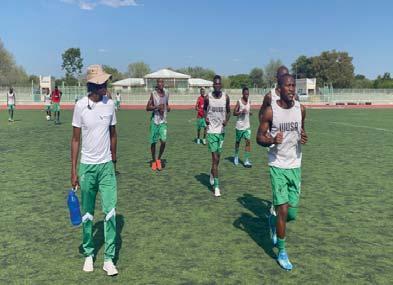
Seven deciding ixtures for Sankoyo’s BFL return
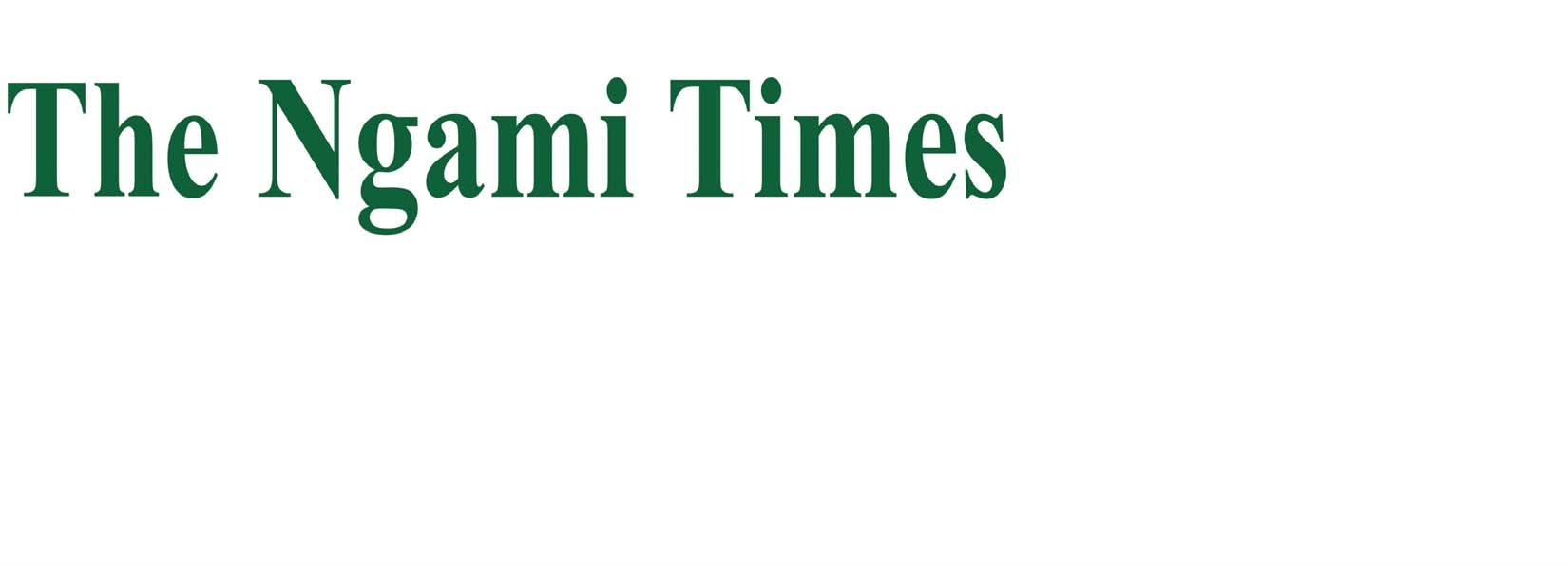
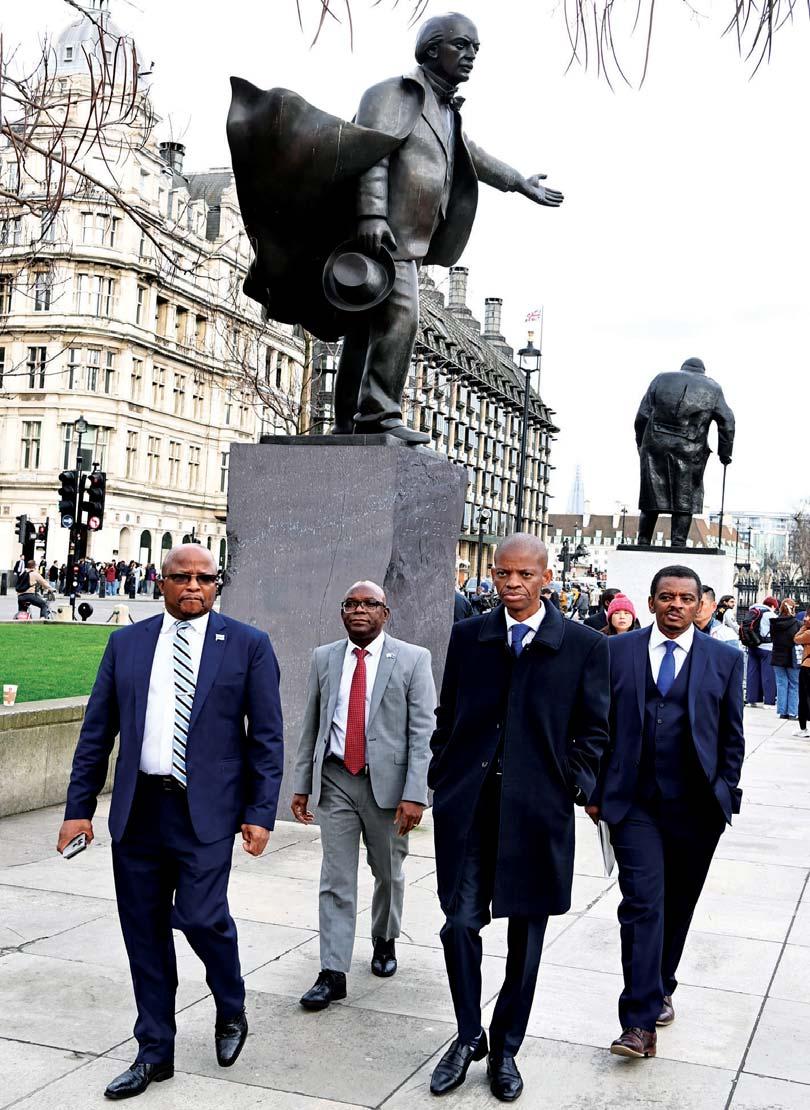








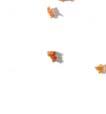











In a last minute turn of events, the ruling Botswana Democratic Party (BDP) has postponed the North West regional congress which was scheduled for tommorow.
Party Secretary General Kavis Kario confirmed in an interview that the North West region will not host its elective congress tomorrow (Saturday) due to some issue within the party.
Kario further revealed that the party will in due course reveal the date for the congress, indicating that other regions gearing up for this pivotal event tomorrow include the Western region, South East, and Central, among the seven regions expected to host elective congress out of the 14 regions. The secretary further revealed that this weekend’s elective congress is expected to be a barometer for the party’s strength and unity as it prepares for national elections.
The BDP, which has been the ruling party since Botswana’s independence, faces the challenge of maintaining its dominance amid growing opposition and calls for change.
He indicated that the elective congresses will be a platform for party members to voice their opinions and elect leaders who will steer the BDP in the coming years adding that it is a time for reflection and decision-making, as the outcomes of these elections could significantly influence the party’s future direction.
“As the BDP holds these critical elections, all eyes will be on the party’s ability to uphold democratic values and manage internal dynamics.
The results from the seven regions will set the tone for the party’s approach to governance and reform, both of which are crucial for Botswana’s continued progress and stability,” he said.
He further added that the BDP’s regional elections are
not just a routine procedure; they are a testament to the party’s commitment to democracy and its adaptability in the face of evolving political currents.
He emphasised that tomorrow will undoubtedly be a defining moment for the BDP and for Botswana’s democratic journey.
Meanwhile, the North West regional, chairperson position will pit two candidates, Moatlhodi Judge Sango and Tebogo Boalotswe, both from Maun West constituency.
From Sango’s camp, Dineo Naga will challenge Chimney Mululwani for the regional vice chairperson position while Galefele Maokeng from Boalotswe’s camp will go toeto-toe with Gontse Lubinda of Sango’s camp for the regional secretary position.
Sango’s camp has Bashi Makeva representing Okavango East for the position of deputy secretary while Omphile Medupi from Ngami
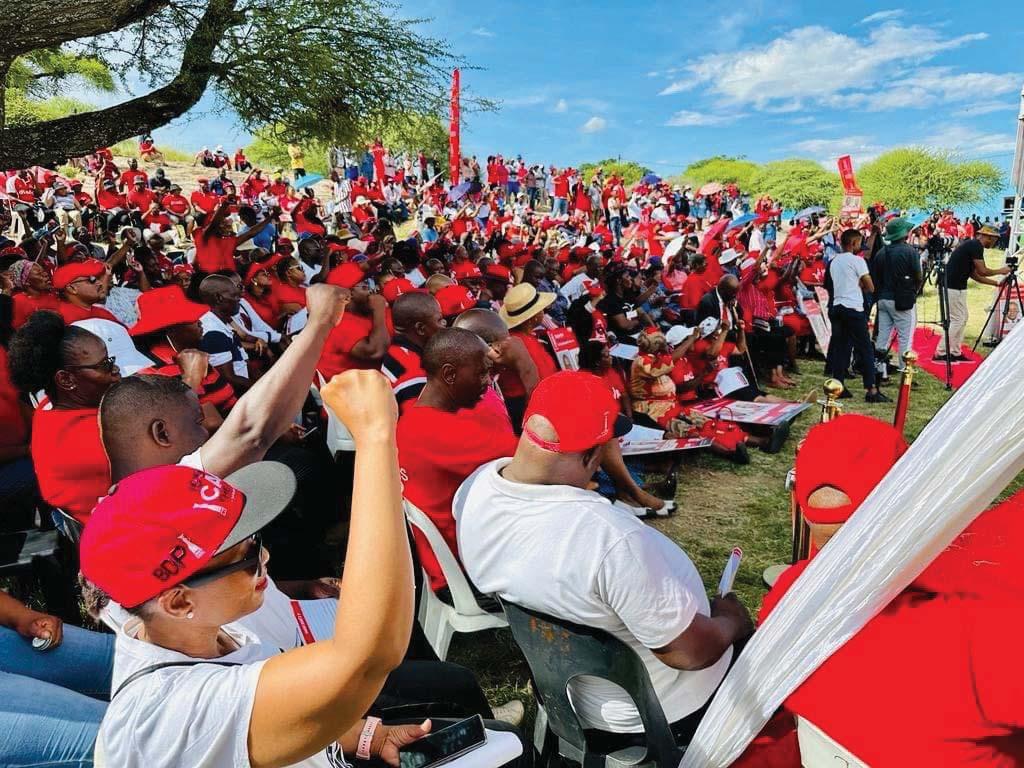
will go for the treasurer position, deputised by Nna Maeze from Okavango East constituency.
From Boalotswe’s camp, they
have deployed Ikopanyeng Gabela from Okavango to challenge for the position of regional vice secretary. Maun North’s Irene Elias will chal-
lenge for the treasurer position while Letshwanetse Balemoge from Ngami will challenge for the deputy treasurer position.
In a display of solidarity against discrimination on people with down syndrome, close to 800 individuals, including teachers and students, gathered at Moremi III Primary School this Thursday to signify a bold call to action, seeking to shatter stereotypes and
promote inclusivity.
Tebogo Nhlatho, the coordinator of the Down Syndrome Association of Botswana (DSAB) in Maun, shared insights during an interview, highlighting the World Syndrome Day’s theme, “End the Stereotypes.” Nhlatho emphasised that combating stereotypes is crucial in fostering a more
22 - 29 March, 2024
MAUN
Friday 21
Saturday 21
Sunday 20 38
Monday
Tuesday 18 37
Wednesday 23 35 sunny
Thursday 19 39 sunny
North and selected areas (Sat/Sun temperatures)
Francistown 20 38 sunny
Gaborone 20 36 sunny
Ghanzi 23 37
Serowe 19 38
Travelers Forecast
Johannesburg 16 30
Cape Town 16 22 broken clouds
Bulawayo 17 36 sunny
Victoria Falls 17 36 partly cloudy
Windhoek 19 36 cloudy
London 2 9 sprinkles late (Information supplied by http://www.timeanddate.com/weather/botswana)
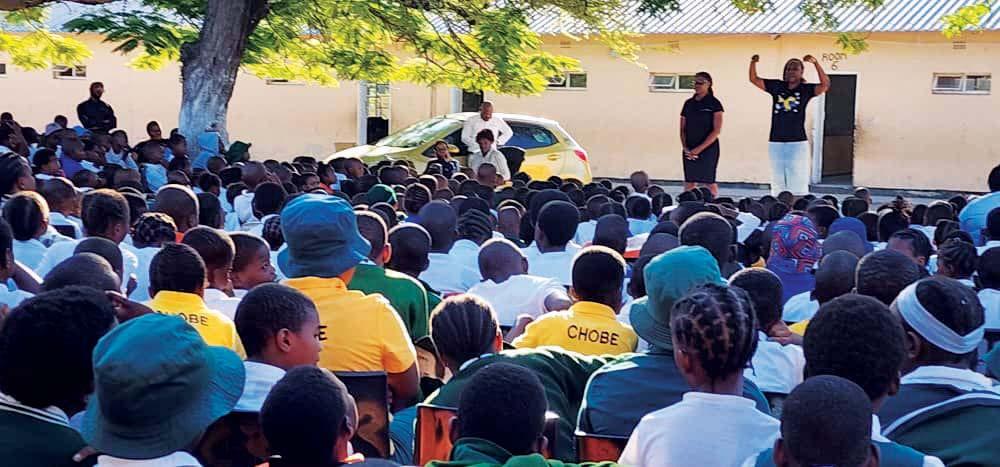
inclusive society.
Nhlatho emphasised, “The stereotypes surrounding individuals with down syndrome have led to discrimination and stifled their ability to speak out. There’s a misconception that they are unable to think or communicate for themselves, which is completely unfounded.” She elaborated that people need to be educated more about down syndrome to shatter such misconceptions and instead urged the community to recognise the capabilities of such individuals, emphasising their right to share experiences, make
mistakes, and grow like everyone else. Down syndrome is a genetic disorder that occurs when an individual has an extra copy, either full or partial, of chromosome 21. This additional genetic material results in developmental changes and physical features characteristic of the condition. People with down syndrome may experience a range of intellectual and developmental disabilities, from mild to moderate, and they often have distinct facial features and physical growth delays.
World Down Syndrome
Day, observed globally since 2012 on March 21st, holds significance with its date symbolising the triplication of the 21st chromosome, the root cause of down syndrome. This year’s theme, “End The Stereotypes,” underscores the need to challenge misconceptions and promote understanding. The campaign encouraged participation in initiatives such as the “lots of socks,” where people wore mismatched socks to spark conversations about down syndrome. Beyond symbolism, the day serves as a platform to advocate for access to
healthcare, early intervention programs, inclusive education, and research to support the well-being of individuals with down syndrome.
Nhlatho concluded by calling on society to embrace diversity and recognize the humanity of individuals with Down syndrome, urging everyone to open their hearts to acceptance and inclusion. As the community came together to celebrate World Down Syndrome Day, it sent a powerful message of solidarity and support for a more inclusive world.
North West District Council
Chairman Itumeleng Kelebetseng has in his address to the just ended full council meeting revealed that anthrax has been ruled out at the cause of mysterious elephants’ deaths that were experienced in the NG 19 concession late last year. He said it has been found that the animals died due to a combination of foot lesions and the raging drought.
A total of 42 elephants died in the Khwai area, after they were found to have difficulties walking, which subsequently affected their ability to access
water and forage leading to their deaths.
“The wounds were suspected to be a result of wild fires and the extremely hot conditions experienced towards the end of year 2023,” Kelebetseng said.
Meanwhile Kelebetseng has noted with concern an alarming increase of elephant poaching in Khwai and surrounding areas. He indicated that council together with the Department of Wildlife and National Parks are closely monitoring the situation.
“Even though poaching intensity has gone down, we still get sporadic cases of
Theft and vandalism of telecommunications infrastructure which has been rife in the southern and western parts of the country are said to have spread to the North West and Okavango Districts with the culprits targeting infrastructures located in secluded remote areas.
The perpetrators are said to target copper wires, batteries, solar panels and generator fuel which are then sold to members of the community and scrap yards. The stolen items them find they way from the scrap yards and sold across border to other African countries.
This was revealed by a representative from Mascom, Patience Moabi when addressing North West District Full Council this week adding that the vandalism has now become more sophisticated as it is done by a syndicate that travels across the country targeting remote areas.
From 2020 to date a total of 490 batteries where each battery costs around P4000 are said to have been stolen from the Mascom Wireless sites.
The impact of this vandalism ultimately affects network coverage which directly leads to revenue loss for the business.
Moabi said the syndicate is very aggressive as they attack and overpower security personnel guarding the sites adding that this has become very dangerous for security officers as some have previously been
bush-meat poaching in various parts of the district I plead with you honorable councilors to discourage constituents from engaging in illegal wildlife activities as this has a negative impact on our fauna,” Kelebetseng said.
Khwai Development Trust Vice-chairperson Paul Mothathobi had previously in an
interview claimed that for a period of four months he had spotted a total number of 10 elephants carcases located within the same radius on different occasions in their concession.
He indicated that from his analysis of the carcases the elephants did not have gunshot wound to suggest poaching,
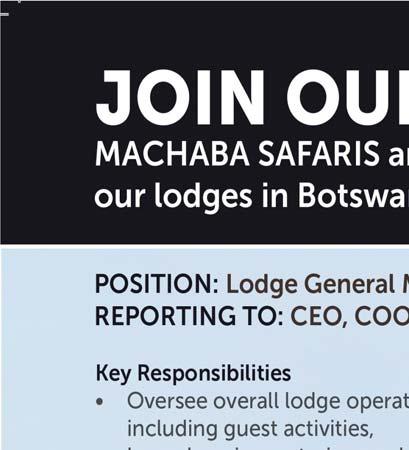
badly injured during the attacks.
Moabi indicated that of recent they have also noticed a new trend of air conditioners, meter breakers, jumper cables theft and generator fuel theft from telecommunications sites.
She noted with concern that in some police stations, the vandalism of telecommunications infrastructure and theft of equipment at the sites across the country is not given the attention it deserves.
Moabi emphasised that scrap yards provide the market for stolen copper cables and other items that are stolen from their sites, urging councils to map way to manage them.
“Scrap yards aid the culprits as they buy copper and batteries stolen from telecommunication sites,” Moabi said.
Nowadays, she said even health facilities are using technology to improve some of their services, but vandalism results in provision of poor services.
“This is worrisome and it requires all stakeholders to come on board to find a solution. I am appealing to the general public to refrain from buying stolen equipment, but instead play a role of citizen vigilantes to curb the alarming situation,” she added.
Moabi said efforts have been made by some operators to engage security officers at their facilities, but stopped because they were exacerbating the situation by conniving with the perpetrators, while some security personnel got attacked.
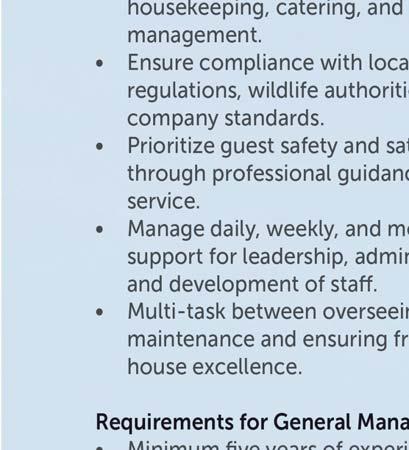
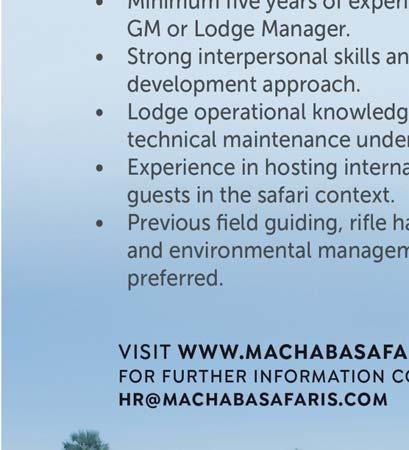
raising his fears that Anthrax may have been the cause as it had been detected in neighbouring countries.
Mothathobi had dismissed assumptions that the elephants might have been killed by drought arguing that the animals are mixed feeders adding that surface water is still available in the Khwai areas.
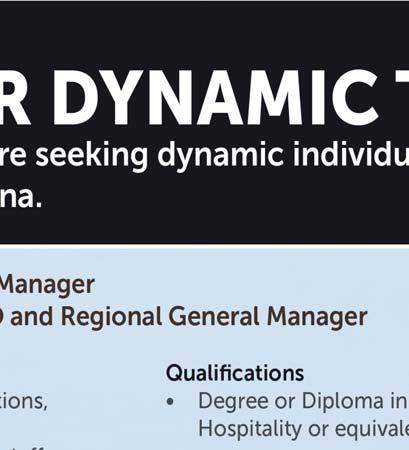
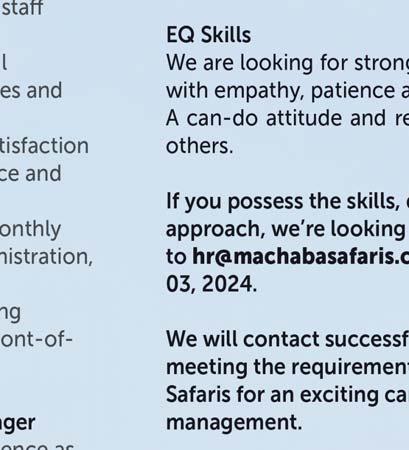
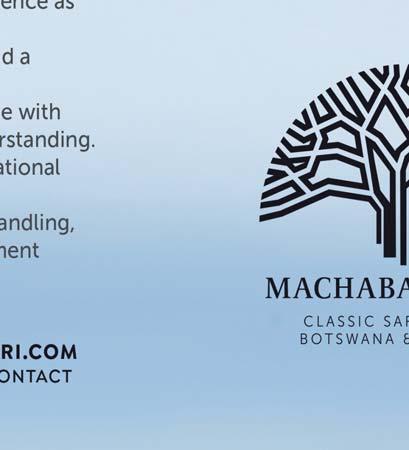
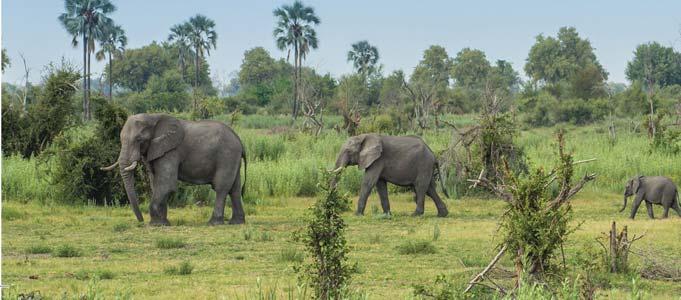
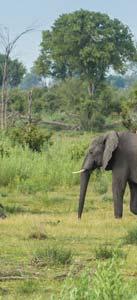
“I think there is need for a research to establish what is killing the elephants in such numbers within a short period and find ways to prevent the deaths. I have been a resident of Khwai and have never witnessed elephants dying in such numbers,” Mothathobi noted.
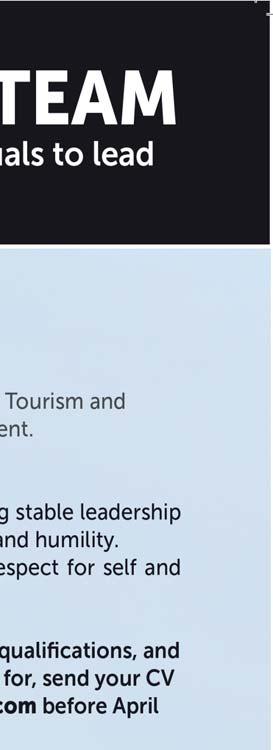
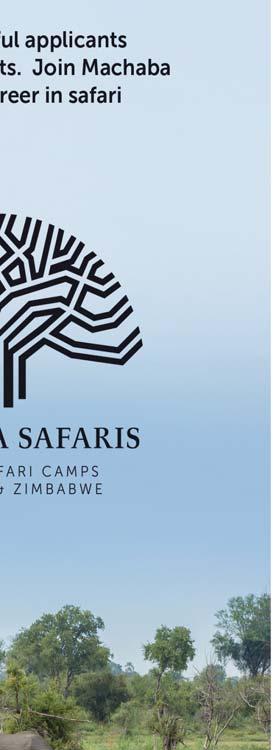
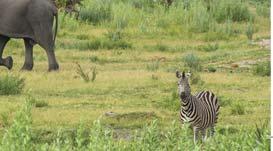
‘‘The Last newspaper established in the 20th Century’’
CONTACTS:
Email: info@ngamitimes.co.bw
Website: www.ngamitimes.co.bw
Telephone: (+267) 686 4807, (Adverts) 686 4819
Cell phone: (+267) 74 588 802 / 71 676 974 (App)
SALES AND MARKETING
Kgothatso Dave Sampora
Tel:(+267) 686 4807
E-mail: kgothatso.sampora@ngamitimes.co.bw
ACCOUNTS
Banyefudi Sampora
Tel:(+267) 686 4819
E-mail: banyefudi.sampora@ngamitimes.co.bw
EDITOR
Bright Kholi
E-mail: bright.kholi@ngamitimes.co.bw
Contact: (+267) 73632144
GRAPHIC DESIGNER
Leatweng Gababonwe
E-mail: leatweng.gababonwe@ngamitimes.co.bw
Contact: (+267) 74394814
PRINTING
Baroma Phetogo
Contact: (+267) 77956066
Printed and published by The Ngami Times Printing and Publishing Co (Botswana) (Pty) Ltd at their offices, Mabudutsa Ward, Maun. Tel; 6864807, Fax 6860257 E-mail: tnt@info.bw. Website: www. ngamitimes. com Printed on recycled newsprint. Member of Media Institute of Southern Africa and Press Council of Botswana.Registered at the Post Office as a newspaper. Company registered in Botswana. All material and photographs appearing previously, currently and in future are protected items of the Copyright Act. Only the editor can provide permission for reusage of such material on receipt of a written request.The public is informed of the existence of the Press Council of Botswana, which endeavours to enhance media accountability and professionalism. For this purpose, the public is urged to refer any complaints, suggestions or comments regarding issues of how the media in Botswana reports generally to the following address: The Chairperson, Press Council of Botswana, PO Box 301315, Tlokweng. Tel 3500378. Fax 3161196.
The North West District Council (NWDC) has approved a P 291 721 251 recurrent budget for the upcoming 2024/25 financial year, comprising P280,227,471 of revenue support grant and P11,493,780 from own income sources. Addressing council on the budget, finance and work committee Chairperson, Honorable Ntlogelang Kebonyekgotla revealed that the budget was a decrease of P3,041,719 (approximately 1.03%) compared to the provisional budget of P294,762,970 submitted in October 2023 adding that council achieved this adjustment by reprioritising its needs to fit within the approved ceiling.
Furthermore, Kebonyekgotla revealed that the approved expenditure ceiling of P291,721,251 for the finan-
cial year 2024/25 reflects an increase of P43,585,349.01 (approximately 17.57%) compared to the current budget of P248,135,902.
This additional allocation will support critical programs and services, indicating that the 2024/25 RSG of P280,227,471 shows a substantial increase of P44,282,229 (approximately 18.77%) when compared to the approved support grant of P235,945,242 for the 2023/2024 fiscal year.
“The council’s income projections for 2024/25 amount to P11,493,780, representing a slight decrease of P696,880 (approximately 5.72%) from the 2023/24 income budget of P12,190,660,” he said. While the budget allocation details are yet to be fully disclosed, it is anticipated that priority areas such as infrastructure development, healthcare,
education, and community services will receive significant attention.
He further highlighted that the largest portion of the recurrent budget of 48% will be dedicated to personnel emoluments, adding the remains focused on fulfilling its targeted priorities, and expressed hope that the awaited developmental budget would fund a substantial number of projects aimed at transforming the livelihoods of the local population.
In addition, the chairperson indicated that the budget designates a significant portion of 25% for special expenses. These expenses cover critical areas such as: Relief of destitute to assisting vulnerable individuals and families and security services that ensure safety and order within the district.
“These special expenses also
include school stationery and equipment to supporting education for students. Food and accommodation that address basic needs as well as payment for refuse contract to manage waste disposal efficiently in the district,” he said.
Meanwhile NWDC Chairperson Itumeleng Kelebetseng emphasised the importance of prudent financial management. He said striking a balance between essential needs and fiscal responsibility remains a priority, urging the house to act on the motions raised of exploring new revenue streams.
Kelebetseng advised the income-generating committee to convene and explore innovative ways of creating revenue for the council. Diversifying income sources will contribute to the council’s long-term stability and ability to serve its constituents effectively.
Chobe District Council has approved a recurrent budget amounting to P106 197 315.00 and the development budget of P30 546 621.00 for the 2024/2025 financial year. Presenting the budget estimates during the Chobe District Special Full Council meeting last week, the Council’s Finance and Works Committee Chairperson Baboloki Mpebe said that the Recurrent Budget shows an increase of P13 219 728.00 from the 2023/24 approved budget.
He noted that the recurrent budget calls for a through prioritisation of those votes that are critical for operations of the council and for delivery of core services to the community.
“These include among them salaries, wages and allowance budgeted at P66 365
380.00, members allowance budgeted at P3 782 310.00, members’ terminal benefits budgeted at P4 293 440, lighting, gas and water budgeted at P3 035 230.00, petrol and lubricants budgeted at P2 253 040.00, school stationery and equipment budgeted at P959 420.00, relief and destitute budgeted at P2 163 100.00,” he said.
He said these votes experience high expenditure every financial year, calling on council to implement cost saving measures and continue to develop new strategies aimed at cutting costs. He urged councillors to ensure more efficient spending and financing of activities.
“I also want to take this moment to plead with the community of Chobe to always pay for services rendered to them by council. It is paramount for council to collect all the estimated revenue in order
to augment the Revenue Support Grant (RSG),” he said. He urged councillors to and strengthen the implementation of the existing revenue collection strategies and also put in place new measures that will increase their revenue base.
Mpebe stated that at the top will be to review some of their such as market rates and advertising and market stall fees.
Regarding the approved Development Budget for 2024/2025 of P30 546 621.00, Mpebe said that the funds are for implementation of their important programmes such as destitute housing, constituency Community Project and Ipelegeng Programme.
In addition, Mpebe said that the district has been allocated funds for the upgrading of some of customary courts Type Grade 2 inclusive of the carry over project of Kachikau Customary Court. He urged
the implementing departments to always guard against projects cost overruns and make sure that most of these funds benefit local communities.
Meanwhile, the approved revenue support grant for the 2024/2025 is P97 702 470.00 which reflects an increase of P14 013 2022 or 16% from the 2023/2024 Revenue Support Grant (RSG). Mpebe noted that the increase is a result of the inclusion of the critical items which need to be catered for in the budget.
He stated that items include the annual incremental creep and a probable salary adjustment of 5%, terminal benefits of Councillors and the personal emoluments for the anticipated increase in number of councillors. He said that the
Total Estimated Income from their own revenue sources is P8 494 845.
A Zimbabwean man facing two counts of murder and entering Botswana through an ungazzeted point of entry was this week had his remand extended by Maun Principal Magistrate Gofaone Mosweu.
On the first count of murder, the 45 year old Future Tshabalala is said to have on the 9th of January 2024 at Boseja ward unlawfully murdered one Oriah Keolopile of Boseja. On the second count the accused is said to have illegally entered Botswana through an ungazzetted point of entry.
Tshabalala’s remand was ex-
tended following prosecution’s plea for extension arguing that investigations on the matter are not complete and they are yet to collect statements from witnesses and awaiting to receive the deceased’s post-mortem. Tshabalala whose plea was reserved opted to remain silent.
The accused person was initially denied bail by the presiding Magistrate Thebeetsile Mulalu in January on reasons that the accused person is a flight risk since he was nomadic in his residence and he did not have a permanent address.
In a previous interview with
Maun Police, Assistant Superintendent Kgakgamatso Koboyatshwene revealed that the alleged unsettling series of occurrences commenced on the 8th when the accused person, who the children of the deceased identified as someone they had not seen before, and their mother entered the woman’s house. The duo reportedly remained locked within the confines of the house from the evening of the 8th until the 10th. According to Koboyatshwene, as the morning of the 10th unfolded, the deceased’s children, growing increasingly concerned about their mother’s well-being, ventured into her
room. Their distress heightened when they reportedly found her unresponsive, lying motionless on her bed. The police were immediately notified and they swiftly went to the scene. Koboyatshwene reported that the woman was then rushed to Letsholathebe II Memorial Hospital where an examination confirmed her tragic death.
In the course of their investigative efforts, the police apprehended a 45-year-old Zimbabwean man from Bulawayo, suspected to be the unidentified individual who had entered the woman’s residence with her two nights prior.

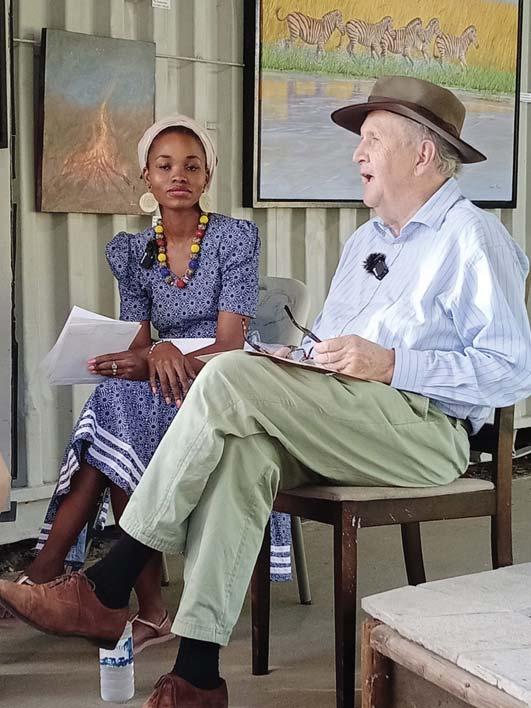 By Bhekinkosi Phiri
By Bhekinkosi Phiri
The No.1 Art Award, a collaborative endeavor between the esteemed Sir Alexander McCall Smith and Space Botswana, has honored three remarkable artists from Botswana who have made an indelible mark in their communities.
In a groundbreaking event this past Monday, Space Botswana illuminated the artistic landscape with its inaugural award ceremony, celebrating the transformative power of art in society.
Speaking about the award’s significance, Atang Arnold the visionary founder and managing director of Space Botswana, emphasised its focus on recognising artists whose work has positively impacted society. Whether through charitable endeavors or social initiatives, these artists have demonstrated a commitment to enhancing the fabric of their communities.
The ceremony itself was a testament to the vibrancy of Botswana’s artistic scene.
Boifhang Samaje, who hails has from Kajaja in the Okavango claimed the coveted first prize, while Odigile
Setshwantso, affectionately known as ‘Sick O’ from Maun, secured second place. The trio was completed by Boitshepo Maramele, whose exceptional contributions earned her a special award.
The influence of Sir Alexander McCall Smith, renowned for his literary masterpiece, The No. 1 Ladies’ Detective Agency series set in Botswana, added a touch of prestige to the event. His admiration for the artwork showcased at Space Botswana underscored the depth of talent within the country.
Founded by the trailblazing
Atang Arnold in November 2019, Space Botswana stands as a beacon of creativity in Maun, nestled within the heart of the Okavango Delta. Crafted from a repurposed 6-meter shipping container, this innovative art gallery offers a unique platform for artists to showcase their creations amidst nature’s splendor.
Looking ahead, Arnold envisions the No.1 Art Award as a symbol of ongoing collaboration and inspiration. With plans to expand the Awards through additional sponsorships, the award aims to motivate artists to deepen their
engagement with their communities, fostering a culture of creativity and compassion.
As the inaugural No.1 Art Award ceremony draws to a close, it leaves in its wake a renewed sense of purpose
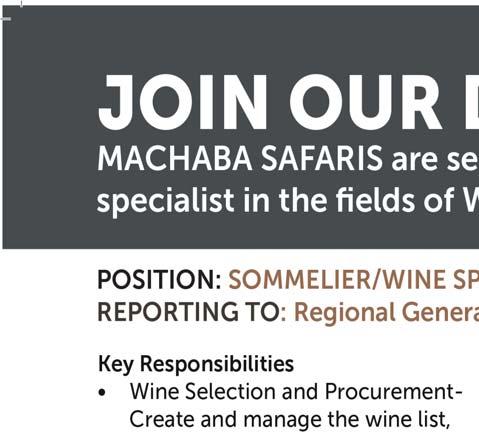
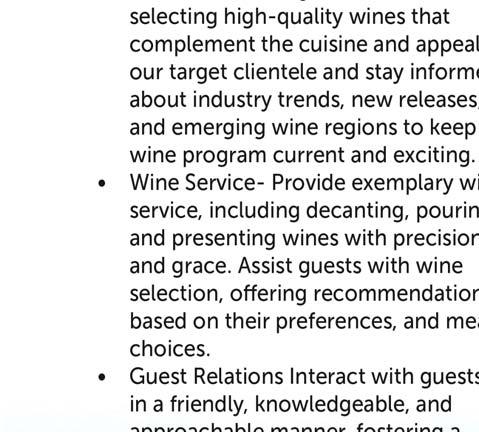
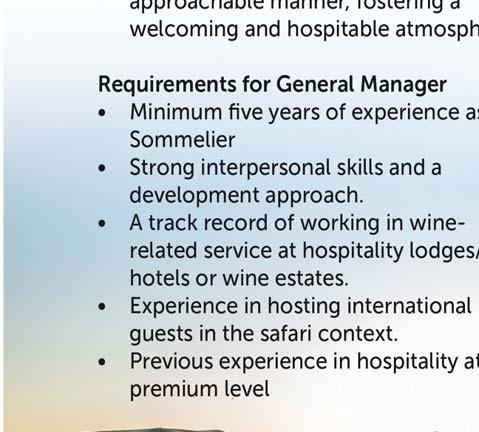
and possibility.
“Through art, we are reminded of our collective capacity to effect change and uplift
those around us. Together, let us continue to celebrate and support the transformative power of creativity.”
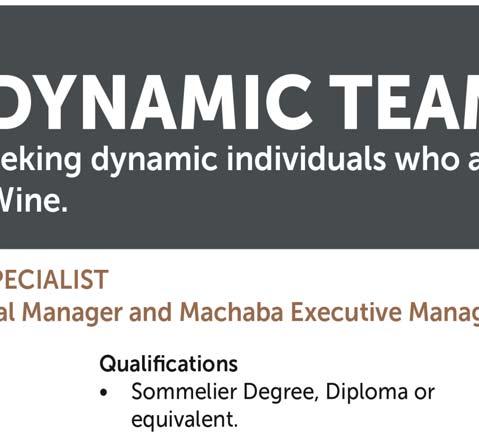
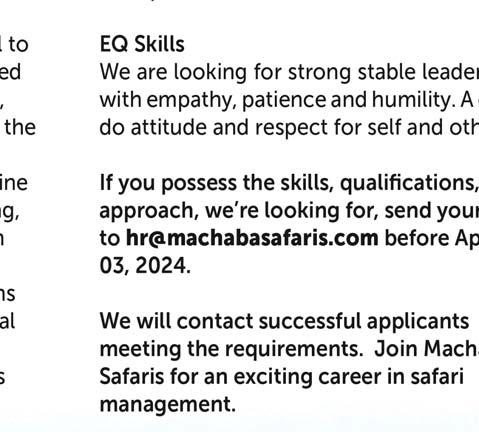
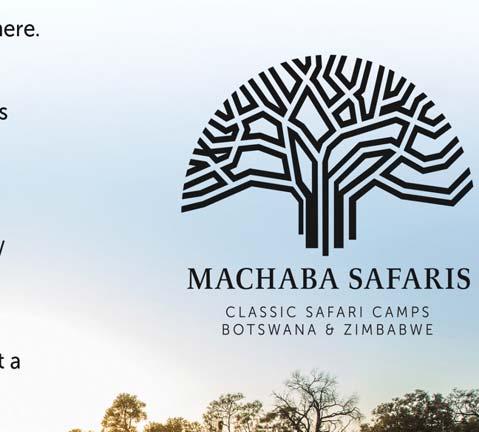
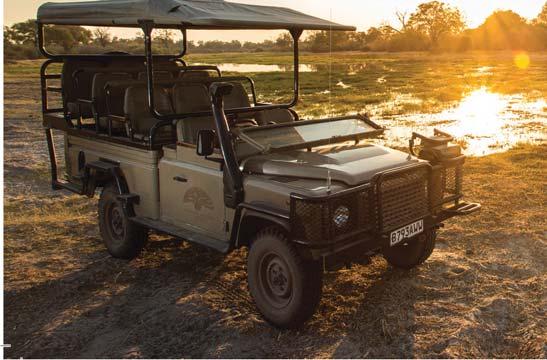
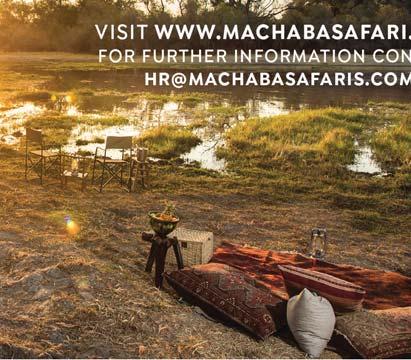
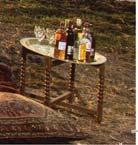
The Botswana Government and local communities living in wildlife areas are currently protesting to the British Parliament about the potential of the UK passing a bill that prohibits trophy imports from Botswana and other Southern African states known as KAZA countries from entering the UK.
The UK is Party to the Convention on International Trade in Endangered Species of Wild Fauna and Flora (CITES) which regulates international trade in over 35,000 species of wild animals and plants, their products (such as animal skins) and derivatives (such as food or medicine).
The Hunting Trophies (Import Prohibition) Bill seeks to ban the importation of legally obtained wildlife trophies from Botswana and other African countries such as Zimbabwe, Zambia, Nambia, Tanzania and South Africa. It is going for the second reading in the House of Lords on March 23, 2024.
For Botswana, the European Union trophy hunting market including the UK comprises of 30% while the USA market is the largest at 70%. In this regard, the British trophy hunting market for Botswana is big and cannot ignored by both the Botswana Government and communities living in wildlife areas. The big question therefore is if this Bill passes at the
House of Lords, what are the implications to conservation and rural livelihoods.
If this Bill can pass, it will compromise the livelihoods of rural communities living in wildlife areas. As a result, both the Botswana Government and rural communities are opposed to the Bill mainly because of the following: i) anticipated loose of income, ii) loose of jobs, iv) loose of community development projects, v) preference of both photographic and trophy hunting as sustainable land use options that complement each other etc. Conversely, animal rights groups who are currently influence British MPs to pass note that if the Bill pass, this will contribute to the conservation of wildlife species in Africa especially those which are threatened. While this is the case, research has established that most of the species targeted have populations that are stable, increasing, or abundant. In addition, trophy hunting is not a major threat to any of the 73 species or subspecies imported to the UK.
The Bill is ill-advised and dangerous to wildlife conservation and livelihoods of people living in wildlife areas in Botswana and Southern Africa.
It fails to adequately consider the benefits of trophy hunting to local communities in wildlife areas, particularly its role in sustaining livelihoods. Most communities in wildlife areas
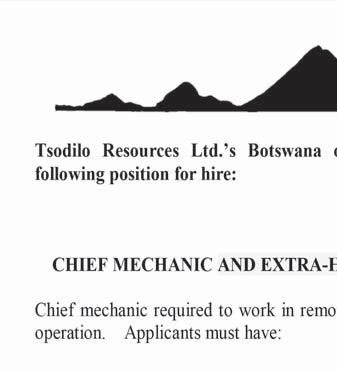
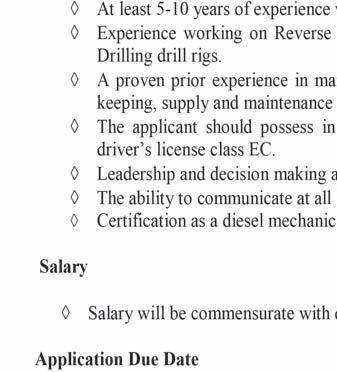
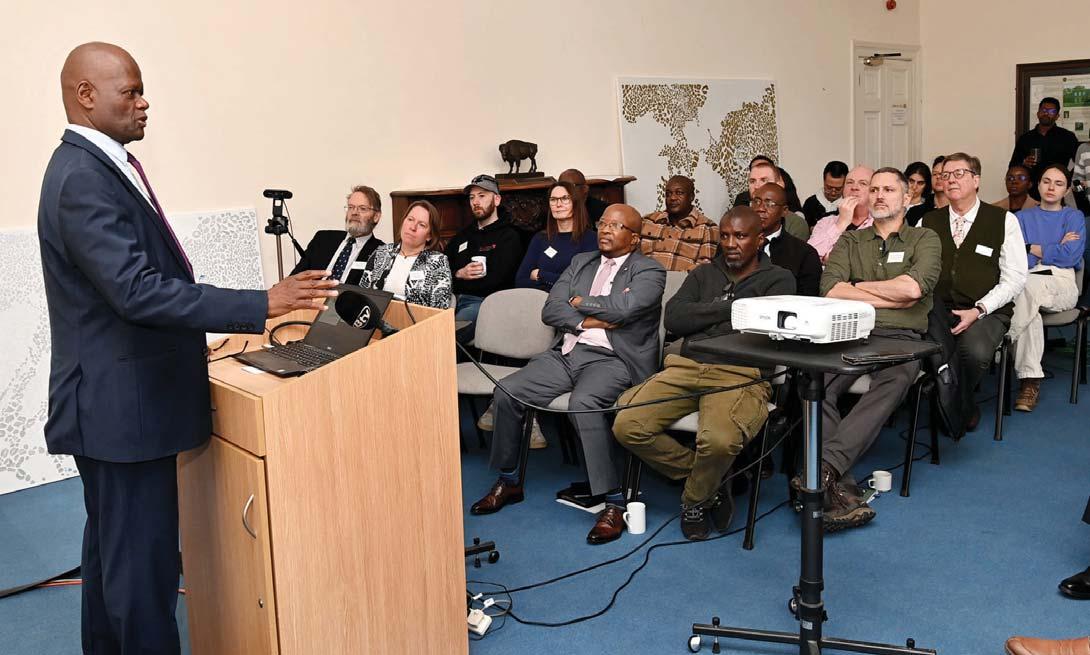
especially those in northern Botswana have Community Based Organisations (CBOs) or Trusts. These Trust generate income through hunting and this income is used in community projects, employment opportunities and reinvestment into other tourism activities such as lodges, campsites etc. In 2022/23, a total of 7,056 people were employed by CBOs. Every government and economy in the world are concerned about employ-
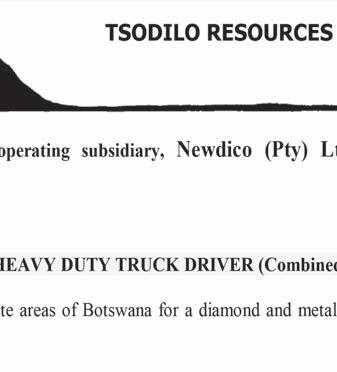
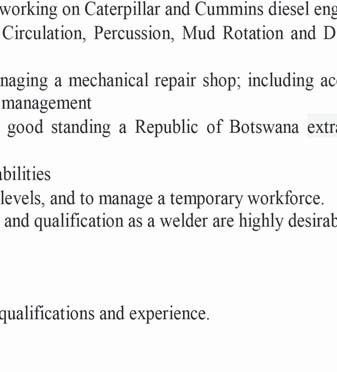
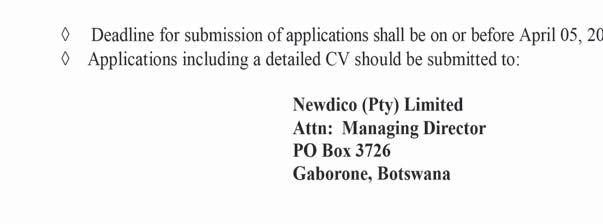


ment opportunities in a country. Still in 2022/23, a total of P134,176,165.20 (USD 9, 874,221.24) was generated by CBOs from concession fees, camping, hunting, quota fees, land rentals and related enterprises of which P31,278,416 (USD 2,301,824.61) was generated from hunting alone from quota. The proposed Bill does not take these contributions of trophy hunting to the lives of marginalised communities in rural Botswana hence it has the potential to cause more harm than good not only to the livelihoods of the people but to the species it is intended to protect. In relation to conservation, the Social Exchange Theory argues that communities are likely to participate and promote wildlife conservation if they derive more benefits that costs from wildlife resources. This means, if the Bill passes and Botswana loses the European market, communities might not be obliged to protect the wildlife species the Bill is intending to protect. The Bill thus fails to appreciate that trophy hunting in Botswana protecting land from conversion to agriculture; provides resources to prevent poaching in the country; directly result in income and employment opportunities for local communities; and enhance population growth for threatened species.
The Bill fails to appreciate that Botswana has a strong legislative framework governing wildlife conservation. Such include: the Wildlife Conservation Policy of 2013, Tourism Policy of 2021, CBNRM Policy of 2007, Wildlife Conservation and National Parks Act of 1992 and an effective institutional approach in the form of the Department of Wildlife and National Parks, the BDF
Anti-Poaching unit etc.
This legislative and institutional framework has resulted in Botswana sustaining a healthy wildlife population in the country. The Bill further fails to appreciate efforts made by Botswana to achieve conservation since the country has set aside a total of 40% of its land for conservation. That is, Botswana has designated 17% of its surface area as National Parks and Game Reserves, an additional 22% of Botswana’s land is designated as Controlled Hunting Areas and 1% is designated as forest reserves.
In total, Botswana has reserved 40% of its land reserved for wildlife conservation. Because of these conservation by Botswana, some of the wildlife species have continued to expand and increase in population. For example, in 1990, Botswana had an estimated population of 50,000 to 60,000 elephants. In 2012, Chase (2012) reported that the numbers had escalated to 130,000 elephants. The KAZA Elephant Survey of 2022 reported that 58% or 132 182 of 227900 (±16743) elephants in the KAZA TFCA survey area were in Botswana. This Bill therefore fails to appreciate these conservation efforts by Botswana. Instead, it appeals like a punishment to the country for having achieved significantly in the conservation of wildlife resources.
The Bill also fails to appreciate that communities living in wildlife areas of Botswana are confronted with human wildlife conflicts which result in the following: Crop damage by wildlife especially from elephants and hippos, damage of livestock infrastructure by wildlife especially elephants, livestock predation by animals such as lions and other pred-
ators, human injuries and at times death by wildlife (e.g. elephants, hippos, crocodiles, lions/predators etc).
While this is the case, trophy hunting is in some areas used as a mitigation measure against these conflicts. In 2022 -23 financial year, a total of 11,938 cases of human wildlife conflicts were reported in Botswana. In the same period, a total of BWP26,014,680 (USD 824.612,301), paid as compensation. It is also estimated that a total of 80 people were injured and 57 were killed by the wildlife between the years 2009 and 2019.
In this regard, there is no where communities in Botswana will be obliged to promote conservation because the cost are high. The implications of enacting the Hunting Trophies (Import Prohibition) bill could have far-reaching negative consequences on wildlife populations, exacerbate human-wildlife conflicts, undermine conservation efforts, and impact the livelihoods and well-being of communities residing in wildlife areas.
The Hunting Trophies (Import Prohibition) Bill appears to have been informed by emotions of Animal Rights Groups, fake news, and unethical research such as that by Adam Cruise’s Report on the trophy hunting of elephants in Botswana’s Community-Based Natural Resource Management areas of 2023.
However, public policy addressing biodiversity loss is most likely to be effective when it is informed by Science with appropriate evidence and considers potential unintended consequences. Public policy that addresses biodiversity loss requires context-specific solutions. As a result, the proposed ban on importing
Continue to page 8

The Ngami Times this week publishes this supplement on Domestic Travel, whose objective is to encourage citizens and residents of Botswana to travel within the borders. The supplement also seeks to assist would be domestic travellers with information on destinations and facilities available out there. The information in this supplement was provided by some operators and our Tourism and Environment Columnist PROFESSOR
JOSEPH MBAIWADomestic tourism is defined by the United National World Tourism Organisation (UNWTO) as travel by residents undertaking tourism activities “within the country of
residence”. In this respect, domestic tourism can be referred to as part of “internal tourism” along with inbound tourism as consumption for both forms of tourism are taking place within the country. In the case of Botswana, domestic tourism thus comprises of the activities of the citizens and residents of Botswana travelling to and staying in accommodation facilities within Botswana and undertaking tourist activities inside Botswana. This should, however, be outside their usual environment for not more than 12 consecutive months for leisure, business, or other purposes. Domestic tourism in Botswana remains very low despite attempts made to promote
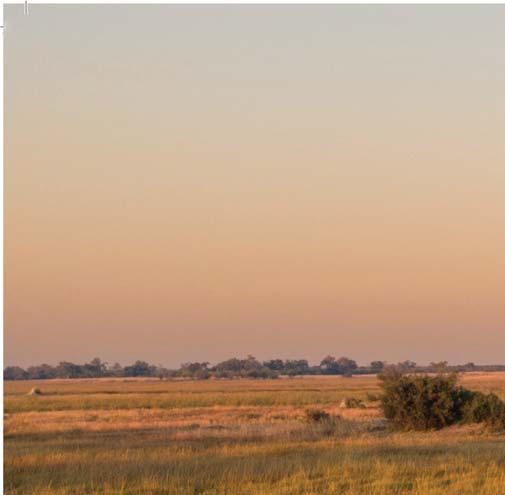

post the COVID-19 pandemic. During the pandemic, it dawned on Botswana that relying heavily on international tourists is not a sustainable tourism approach for the country and the tourism industry.
As a result, there were attempts by government through the Botswana Tourism Organisation (BTO) and industry players through the Hospitality and Tourism Association of Botswana (HATAB) to encourage domestic travel especially to wildlife based destinations, lodges and facilities in the Okavango Delta at rates designed specifically for locals. To date some citizens have taken cue and travel locally, and continue to visit and stay in the Oka-
vango Delta.
Domestic tourism in Botswana has a lot of advantages.
This is because domestic tourism can be used as a tool to eliminate local poverty, generate employment and economic growth, and alleviate upgrade infrastructure. For example, CEDA in Botswana is known for heavily funding local businesses such as lodges, B&Bs, shopping malls etc.
All these services are partly meant to promote local trade and benefit domestic tourists.
There is a boom in shopping malls in Maun, in addition to the tourism resort and gateway to the Okavango having over 30 small lodges.
All these facilities especially lodges are used by domestic travellers especially on week-
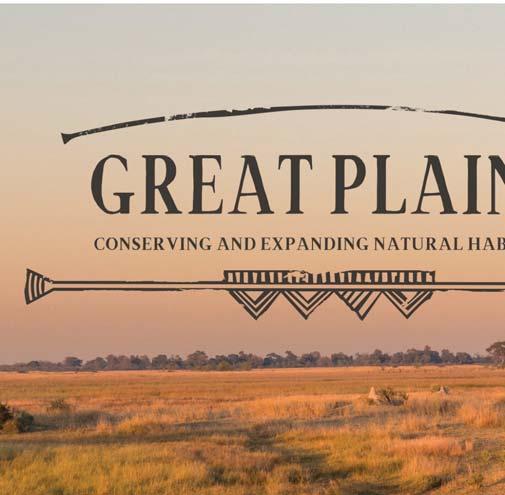
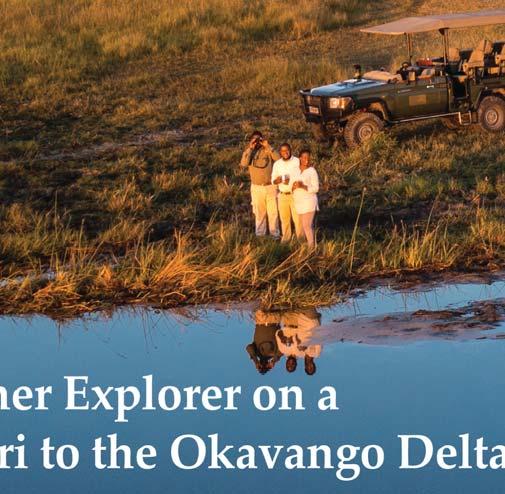
ends when people visit Maun for weddings, funerals, and sporting activities.
During the festive seasons of Easter Holidays in April, Presidents Holidays in July, Botswana Day in September and Christmas and New Year Holidays, accommodation facilities in Maun become over booked and shopping malls become crowded because of the high presence of domestic tourists.
Domestic tourism also has an advantage in that it is not necessarily susceptible to international shocks such as pandemics, wars and other outbreaks which often restricts international travel.
Promoting domestic tourism in a country is thus an excellent strategy to be adopted to mitigate against international shocks that can affect the economy.
Domestic tourism throughout the world is a predominant but it is an invisible portion of tourism industry. The bias on international tourism ignores most domestic tourists and their contributions. In addition, consistent data on worldwide domestic tourism are not so readily available. In Botswana, as is the case in many other parts of the world, domestic tourism statistics is wanting. However, indications are that the numbers of domestic travelling in Botswana is still lower when compared to international arrivals.
Continue to page 3
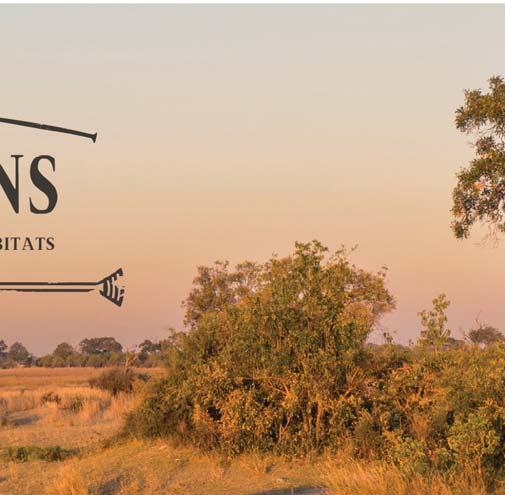
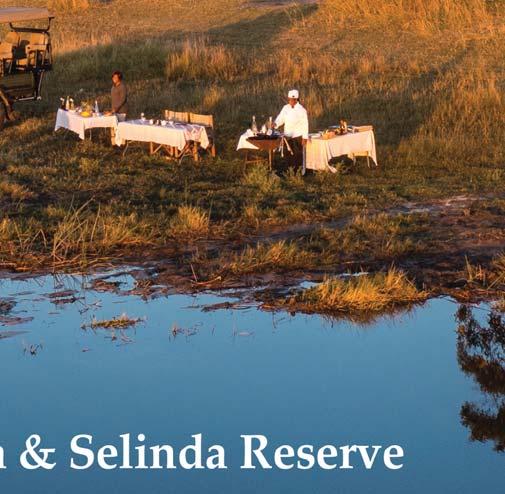


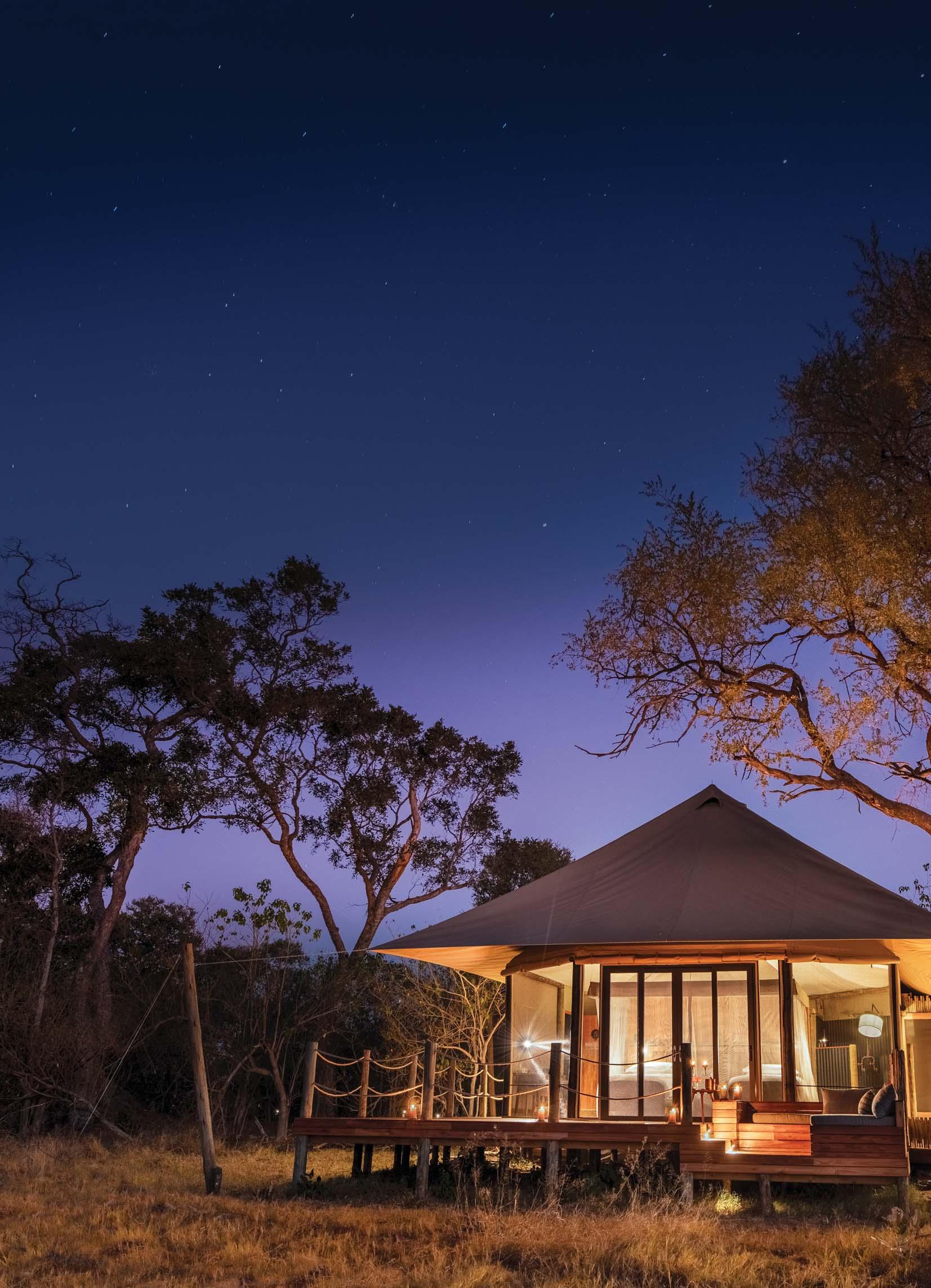


From page 1
The tourism statistics 2006–2010 report notes that an estimated 2.1 million international tourists visited Botswana in 2010 against 1.2 million domestic visitors in the same period. Similarly, in 2019, a total of 2,360,834 non-citizens arrived in Botswana. Out of these 1,555, 399 (65.9 percent) were international visitors (tourists).
Domestic tourists or those visiting friends and relatives (VFR) purpose of visit represented 30.9 percent (480,927) of total tourists in 2019. In terms of expenditure, research has shown that VFR does not contribute much to the tourism economy when compared with international tourism.
For example, Botswana’s domestic tourists spending was P72 million on accommodations against P2.2 billion by international visitors which further signifies low contribution of the VFR market to the local economy in 2010. Research has established that in 2019, international tourists spent BWP 11 091.0 million (USD 1 000.3 million), accounting for 62.8% of total exports, and in 2020, international tourists expenditure was BWP 4 585.4 million (USD 413.4 million), translating to 33,6% of total exports, (a decline of 58.7%), while in 2021 the expenditure was at BWP 5, 710.0 million (USD 515.0 million), accounting for 26.0% of total exports; showing an increase of 24.6% from the year 2020 (WTTC, 2022).
Comparatively, domestic visitor expenditure in 2019 stood at BWP 5, 255.1 million (USD 474.0 million). In 2020 it was BWP 3, 826.4 million (USD 345.1 million) (a decline of 27.2% from 2019), while in 2021 it was BWP 4, 640.2 million (USD 418.5 million); showing an increase of 21.3% from 2020 (WTTC, 2022).
Between 2020 and 2021, both international and domestic tourists figures remained low because of the COVID-19 pandemic. For example, in 2020, Botswana received a total of 358,225 visitors. This means that tourists and traveller arrivals declined by 80.4 percent (1,472,049) and 80.7 percent (2,087,077) respectively compared to 2018. In the same period, Botswana received a total 76,753 domestic tourists. While the numbers of international and domestic tourists remained low during the COVID-19 pandemic, such numbers in 2023 have also recovered to the 2019 figures. The lesson from COVID-19 pandemic is that domestic tourism can always be used to mitigate against international shocks that affect intentional tourism especially travelling.
Domestic tourism has does not necessarily enjoy the support of governments especially in rich wildlife destinations such as those of Southern Africa, East Africa, and Central Africa. Governments in these regions are pre-occupied in creating tourism infrastructure such as airports and road infrastructure to support the arrival of intentional tourists. Research has established that there is limited support for domestic tourism by governments not only in Botswana but around the world in general. This low support is attributed to the low contribution of domestic tourism to the economy of the country when compared to intentional tourism. Ghamire (2001) notes that governments in developing countries offer limited support to domestic tourism because domestic tourism and regional tourists have a low spending power compared with tourists from developed countries. This scenario is typical of tourists visiting the Okavango Delta. Most of the tourism facilities and services (e.g. lodges/accommodation, mobile safari services etc) prefer international tourists from developed countries when compared to citizen tourists. In this regard, tourism companies operating in the Okavango Delta is focused on receiving wealthy foreign visitors from developed countries and neglect or ignore the potential of mass tourism involving domestic and regional tourists. Domestic tourism in Botswana is further associated with challenges such as those of a lack of a diversified tourism product that would otherwise increase domestic tourism.
That is, the fact that Botswana’s tourism industry is predominantly characterised by a single wildlife product, high prices of services in the tourism industry especially in the Okavango Delta, the lack of planning for leisure travel by domestic tourists and a culture of low leisure travel are the most factors challenging the growth of domestic tourism in Botswana.
Domestic tourism product in Botswana is not well diversified and developed, however, there is room to improve it. There is need for a diversified tourism product in the country. For example, indicates are that domestic tourists prefer events such as Khawa Dune Challenge, Makgadikgadi Epic, Toyota Desert Race, and other cultural events such as Letlhafula, nightlife as well as sporting activities such as football, Kazungula marathon and so on. Infrastructure to support these events can thus be developed so is the entire MICE tourism (Meetings,
incentives, conferences, and exhibitions tourism). As a country, we need to develop a MICE strategy to promote MICE tourism which would otherwise promote domestic tourism as well.
Botswana also needs to adopt a diversified tourism approach moreso that the tourism industry is considered wildlifebased. The wildlife-based tourism approaches have been viewed as one of the reasons why domestic tourism and Batswana do not travel much within Botswana. Much of
the wildlife-based tourism is carried out in the Okavango Delta and Chobe areas and prices charged at facilities in the Okavango Delta are too high.
As a result, we need to consider making provision for concessionary rates for residents especially in the accommodation sector for those visiting facilities such as the Okavango Delta. Tourism operators may not be comfortable in lowering prices to accommodate the domestic market, however, statistics

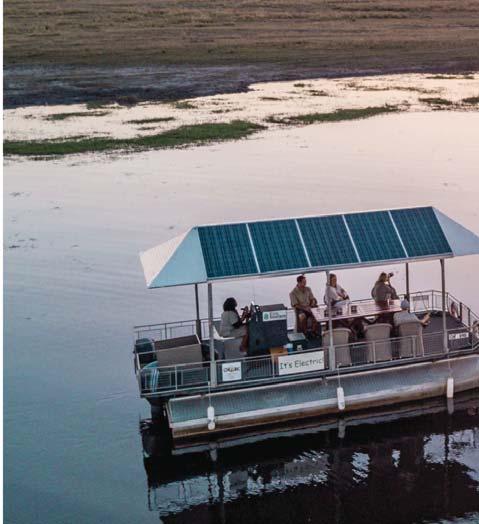
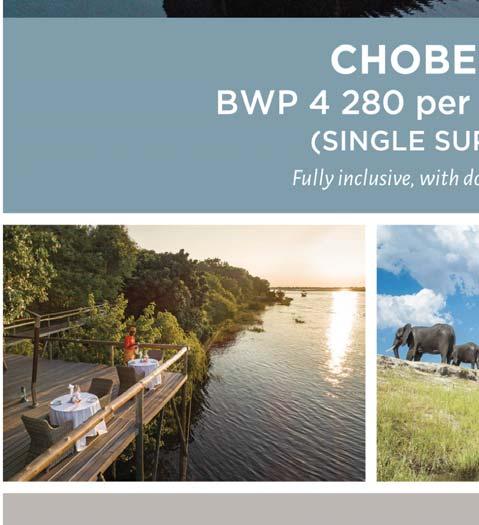
show that there are a growing number of outbound leisure travellers to regional destinations such as Namibia, South Africa, Zanzibar etc. This indicates a market for leisure tourism products which can benefit from a diversified provision and better pricing at home which will lead to more benefits for Botswana in increased employment and addressing the seasonality issue. With a diversified tourism product, public awareness campaigns could then be done to sensitize the domestic tour-
ism market about the product offering within Botswana.
Finally, while Batswana promote domestic tourism when attending events such as Khawa Dune Challenge, Makgadikgadi Epic, Toyota Desert Race, and other cultural events such as Letlhafula, nightlife, sporting activities such as football, Kazungula marathon and so on, should be motivated to adopt the habit of travelling within Botswana to other areas such the Okavango Delta to enjoy the beauty of their country.




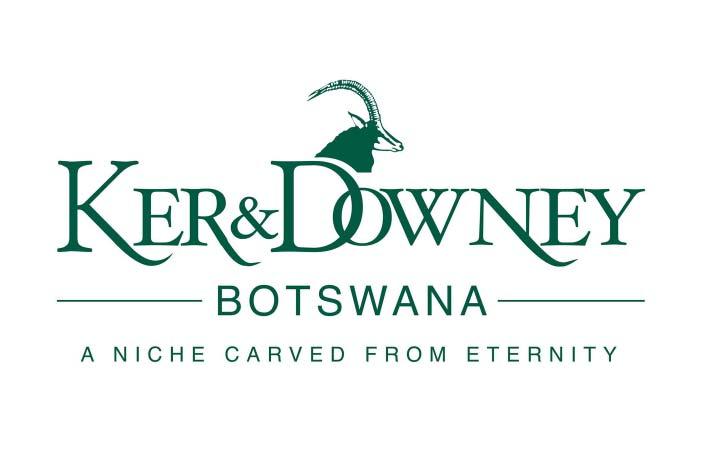
KER & DOWNEY BOTSWANA IS A NAME THAT IS – AND ALWAYS WILL BE –ASSOCIATED WITH EXCLUSIVE, TIMEHONOURED SAFARI EXPERIENCES. OVER FIVE DECADES IT HAS DEVELOPED INTO ONE OF BOTSWANA’S MOST ESTEEMED SAFARI OPERATORS, REPRESENTING LUXURY SERVICE AND PERSONAL ATTENTION TO DETAIL.
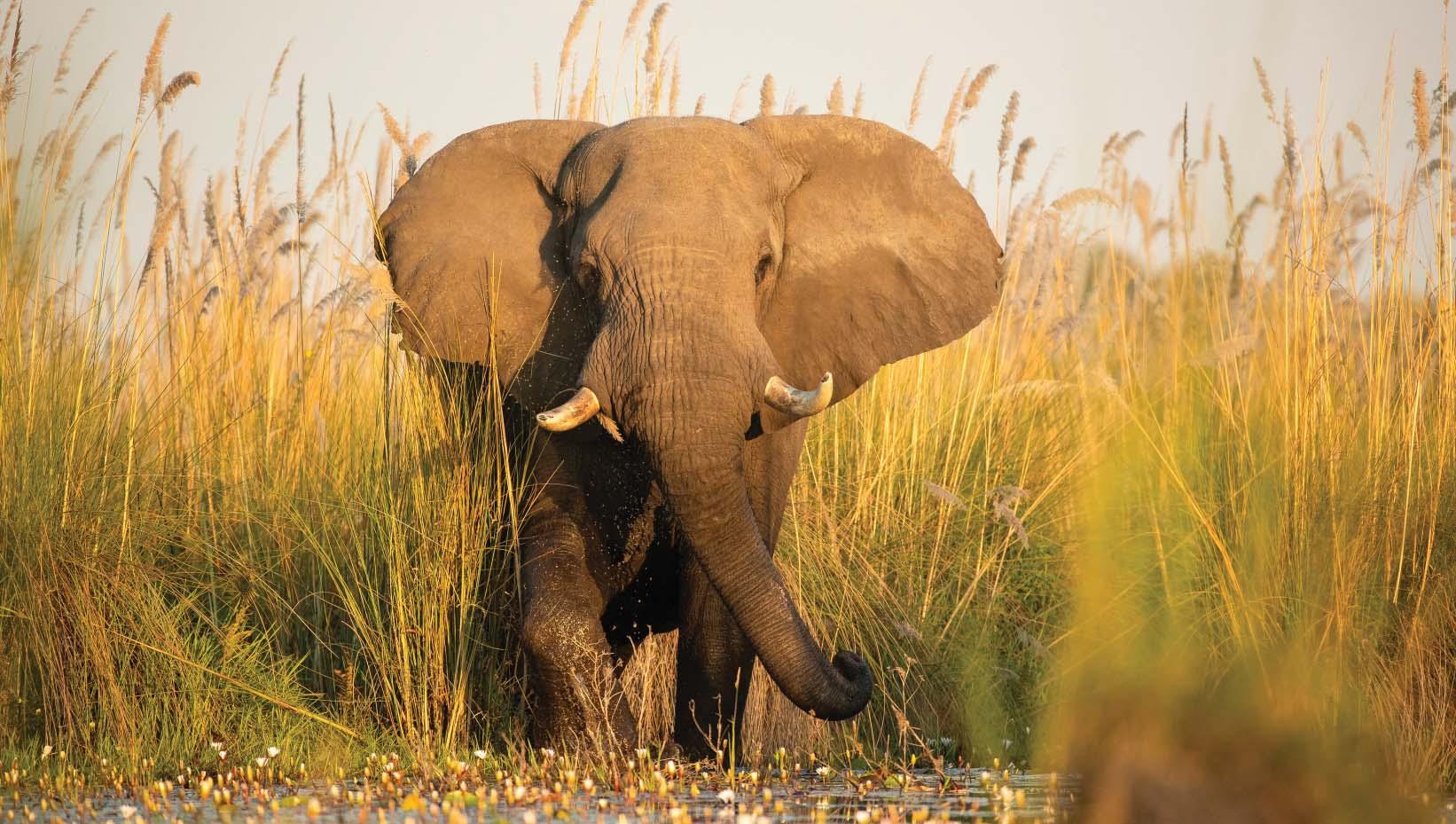
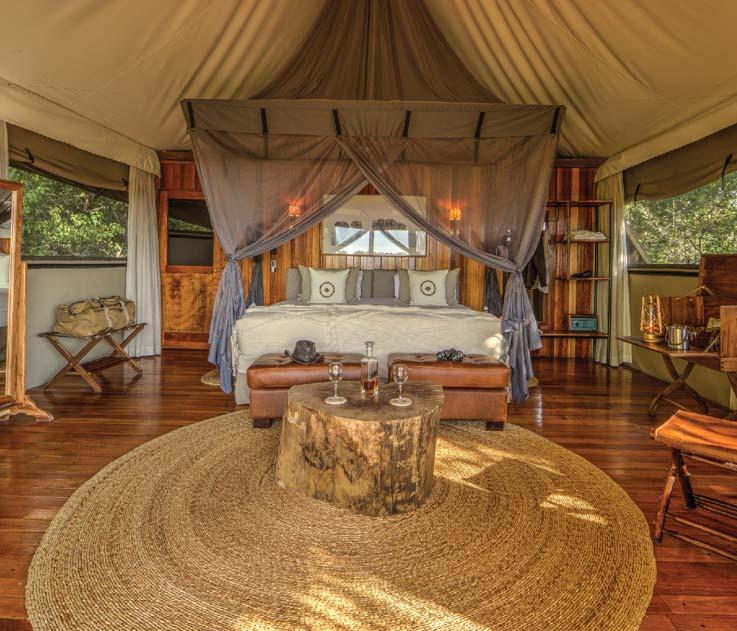
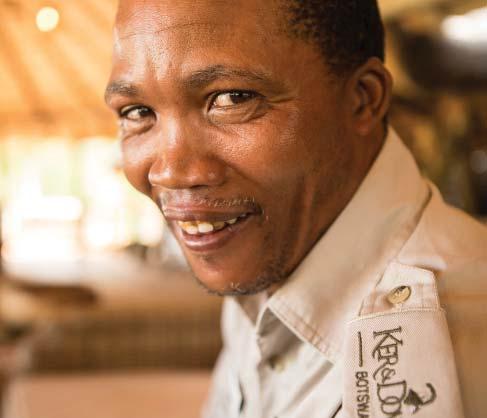
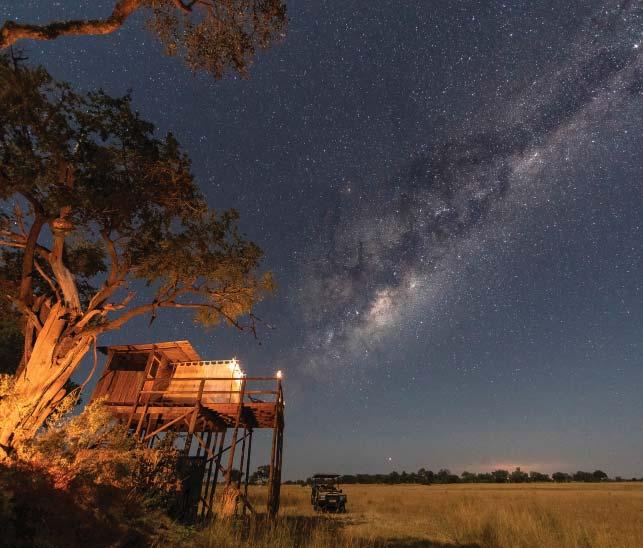
OKAVANGO
MOREMI GAME RESERVE -OKUTI
CENTRAL KALAHARI -DINAKA
*With Professor Joseph Mbaiwa

UK’s Hunting Trophies (Import Prohibition) Bill – Ill-informed and Misguided
Last week I wrote about the UK’s Hunting Trophies (Import Prohibition) Bill before the House of Lords as opposed by rural communities in wildlife areas.
This week, I would like to note that the Bill appears to have been informed by emotions of Animal Rights Groups, fake news, and unethical research such as that by Adam Cruise’s Report on the trophy hunting of elephants and CBNRM in Botswana.
There is equally a misconception in the western countries that trophy hunting in Botswana is destructive and uncontrolled. These misconceptions contribute to the misinformation recognised in this UK Bill. However, I would like to correct the misconception and state that hunting in Botswana is controlled and undertaken guided by the following scientifically tested approaches:
• Hunting Quota – the Department of wildlife and National Parks decides on the annual hunting for each concession area in the country. This quota is decided based on existing ariel surveys of healthy species.
In addition, Botswana observes requirements provided by CITES especially on elephant hunts e.g. Botswana is allowed to hunt 400 elephants annually by CITES.
The 400-elephant figure is an insignificant and has not been proven to contribute to elephant decline nor does is indicate that elephant species in Botswana are in danger. Apparently, the opposite is happening in that Botswana has been able to sustainably use and manage its wildlife populations. Selective hunting - hunting in Botswana is selective. That is, it targets those with healthy populations such as elephants and buffaloes. Species with lower numbers such as rhino and lions are not hunting. In addition, hunting targets old males which are no longer productive. Breeding females and young animals are not hunting;
• Buffer and Marginal AreasTrophy hunting in Botswana is carried out in marginal areas which are otherwise not profitable for photographic tourism. These marginal areas are peripheral and do not attract photo tourists. They also act as buffer zones between human settlements and wildlife areas; Botswana acknowledges that trophy hunting is a land use option that supports conservation and complements photographic tourism to achieve sustainable use of wildlife resources in Botswana. The UK Hunting Trophies (Import Prohibition) Bill fails to appreciate this contribution. The Bill should learn experience from three case studies on what happens to wildlife conservation when a trophy hunting Ban is effected in an areas. These experiences include the following:
a.Trophy Hunting Ban in Kenya
- Kenya banned hunting in 1977. Between 1977 and 1996, Kenya experienced a 40% decline in wildlife populations, both within and outside of its national parks (Scott, 2013). Kenya’s wildlife numbers have continued to fall with wildlife numbers today being less than half of that which existed before the ban (Scott, 2013). Therefore, a ban on safari hunting does not halt decline in wildlife populations, instead it can escalate it.
b.Trophy Hunting Ban in the Luangwa Valley, Zambia - In the Luangwa Valley, to halt the drastic loss of elephants and rhinos to poaching in and around protected areas brought in community benefits from wildlife which included: i) Trophy hunting, ii) meat from hippo quotas to the community, and, ii) employment as community scouts. The results of community benefits from wildlife resources through their community project were a tenfold reduction in rhino and elephant poaching and improved attitudes to conservation. Chiefs in the area instructed their people to report any suspicious people in the area (Lewis et al (1990). A few years later, Government banned trophy hunting in this area. The result was that the whole community project collapsed because of this ban on trophy hunting. The consequences were that rhino and elephant population were extirpated in the Luangwa valley.
c.Increased wildlife poaching in Botswana (2014-2019) – The hunting ban or suspension in Botswana between 2014 and 2019 resulted in increased poaching and human wildlife conflicts.
For example, in 2014, there were 2,500 cases reported, by 2018, such cases had increased to 7500 and to 11,938 cases by 2022. The hunting ban resulted in the increase of incidents of crop damage by wildlife, livestock predation, reduced benefits from wildlife by communities, increased negative attitudes by rural communities towards wildlife conservation. It also led to increased poaching and indiscriminate wildlife killings (e.g. through wildlife poisoning). For example, 4000 wild animals were being harvested illegally and that 620,000 kg of bush meat was harvested annually in Ngamiland (Rogan et al. 2017). This was not good for the conservation of wildlife resources and tourism development.
Trophy hunting is thus a management/conservation tool when applied appropriately with the knowledge of wildlife populations. The UK Bill is thus ill-advised and dangerous to wildlife conservation and livelihoods in Botswana hence the House of Lords should consider rejecting it.
*Joseph E. Mbaiwa, PhD is a Professor of Tourism Studies, at the Okavango Research Institute, University of Botswana in Maun.
Impact Fund and People’s Path have joined forces to catalyse community initiatives and bolster small businesses in Tsutsubega to unlock the untapped potential of the local tourism value chain, ensuring that Tsutsubega thrives as a competitive player in the industry. Impact Fund, led by Ruth Stuart, has been a driving force behind Tsutsubega community empowerment and sustainable growth, harnessing expertise to uplift and create pathways to prosperity by assisting in the establishment of the Light of Tsutsubega Development Company (LTDC).
Addressing Tsutsubega the community this week, Stuart revealed that the company will facilitate access through strategic partnerships and a capacity-building programs and ensure local businesses gain access to critical resources. She highlighted that whether it’s training, funding, or market linkages, Tsutsubega’s entrepreneurs were now better equipped to navigate the complex tourism value chain.
Furthermore, she indicated that the company will help promote effective engagement, connecting small enterprises with larger players in the industry by fostering collaboration, knowledge sharing, mentorship to pave a way for effective engagement within the tourism ecosystem.
Regarding the People’s Path, Stuart revealed that the People’s Path engages directly with Tsutsubega’s residents, identifying their needs and aspirations to ensure that development initiatives align with the community’s vision.
“Understanding the intricacies of the tourism value chain is crucial. People’s Path conducts workshops, seminars, and awareness campaigns, equipping Tsutsubega’s entrepreneurs with the knowledge needed to thrive,” indicating that both Impact Fund and People’s Path share a common vision: a vibrant Tsutsubega where every individual has a stake in the tourism industry. Stuart further emphasised that their collaborative efforts are already yielding results, with small businesses gaining traction and Tsutsubega’s profile rising on the global stage. As she aptly puts it, “We’re not just building businesses; we’re building dreams. Tsutsubega’s success story begins with us.”
Kgosi Edwin Maleho of Tsutsubega applauded the good work done by Impact Fund and their partners, indicating his community has received installation of solar systems, WIFI and construction of ablutions as well as renovation of offices in the village.
Kgosi Maleho further revealed
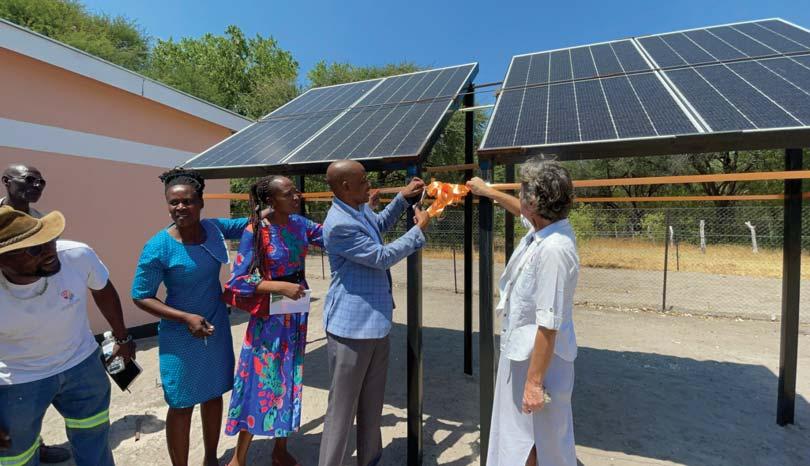
that their relationship with Impact Fund will continue to thrive for many years, indicating that, Tsutsubega stands poised to transform its fortunes.
“Several other community initiatives are making a difference in Tsutsubega, among them, Elephant Havens through habitat protection, community outreach, and the rescue and hand-rearing of young elephant orphans. Elephant Havens aims to be a leading voice in wildlife conservation awareness and protection. Their vision is a world where African elephants and local communi-
ties coexist harmoniously, and where young elephant orphans are saved and reintroduced into the wild,” he noted.
Kgosi further indicated that
Tsutsubega also has a good working relationship with Africa Foundation’s water projects adding that in collaboration with and beyond and generous donors, the Africa Foundation drilled a borehole with a capacity of approximately 3000 liters for the Tsutsubega community in 2020.
“The Tsutsubega community is also working with Royal African Safaris to develop sustainable tourism projects and ben-
efit from the wildlife they live with. This project aims to empower the community and enhance their engagement within the tourism industry. These initiatives collectively contribute to Tsutsubega’s growth, resilience, and well-being,” he said.
Light of Tsutsubega Development Company (LTDC), Ntshiang Kedumetse revealed that the company will help create more employment opportunities in Tsutsubega, indicating that they will soon apply for the allocation of land by the Tawana Land Board to start a camp site business.
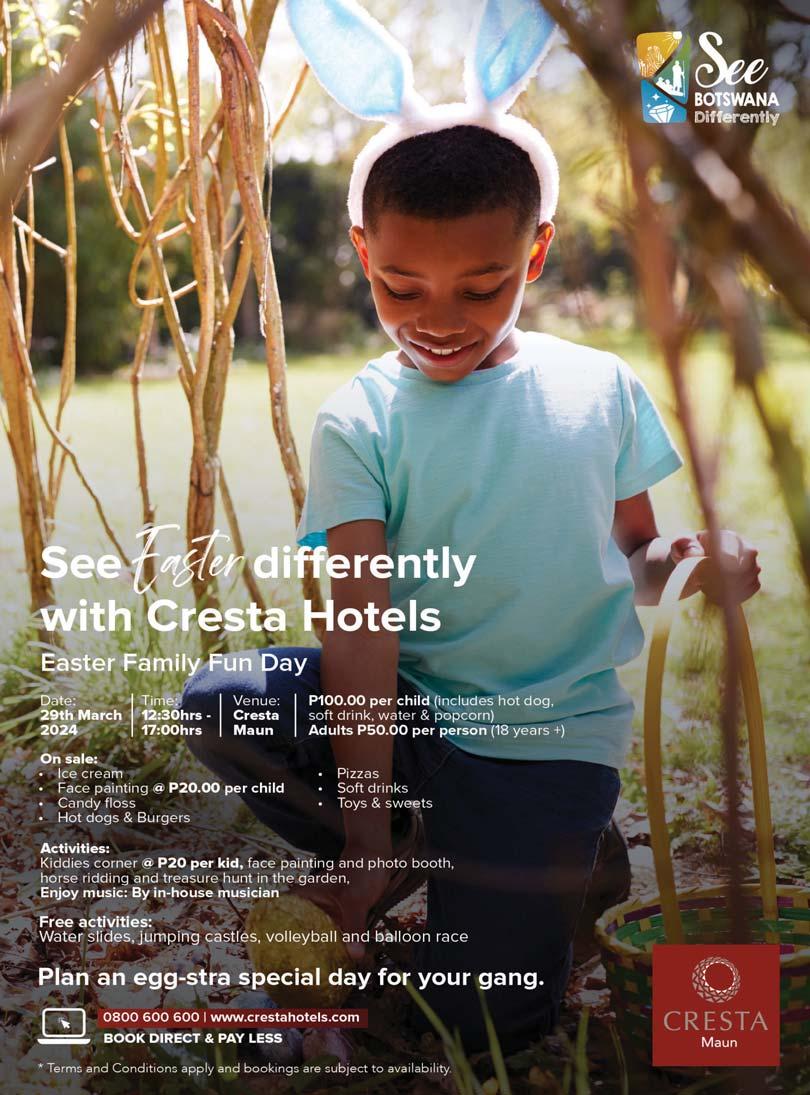
From page 6
hunting trophies to the UK is disproportionate and may harm biodiversity.
While there are wildlife species in Botswana which are on the decline and endangered, there is equally a misconception in the western countries that trophy hunting in Botswana is destructive and uncontrolled. These misconceptions contribute to the misinformation recognised in this UK Bill. However, I would like to correct the misconception and state that hunting in Botswana is controlled and undertaken guided by the following scientifically tested approaches:
• Hunting Quota – the Department of wildlife and National Parks decides on the annual hunting for each concession area in the country. This quota is decided based on existing ariel surveys of healthy species. In addition, Botswana observes requirements provided by CITES especially on elephant hunts e.g. Botswana is allowed to hunt 400 elephants annually by CITES. The 400 elephant figure is an insignificant and has not been proven to contribute to elephant decline nor does is indicate that elephant species in Botswana are in danger. Apparently, the opposite is happening in that Botswana has been able to sustainably use and manage its wildlife populations.
Selective hunting - hunting in Botswana is selective. That is, it targets those with healthy populations such as elephants and buffaloes. Species with lower numbers such as rhino are not hunting. In addition, hunting targets old males which are no longer productive. Breeding females and young animals are not hunting;
• Buffer and Marginal Areas - Trophy hunting in Botswana is carried out in marginal areas which otherwise not profitable for photographic tourism. These marginal areas are peripheral and do not attract photo tourists. They also act as buffer zones between human settlements and wildlife areas; Considering the above measures, it can be argued that Botswana has measures in place designed to achieve sustainable wildlife conservation in the country. Botswana acknowledges that trophy hunting is a land use option that supports conservation. In this regard, trophy hunting is carried out in marginal and peripherical areas while photographic is carried out in prime areas. These two land
use options complement each other and support the sustainable use of wildlife resources in Botswana. A scenario which the UK Hunting Trophies (Import Prohibition) Bill fails to appreciate.
The Hunting Trophies (Import Prohibition) Bill should learn experience from three case studies on what happens to wildlife conservation when a trophy hunting Ban is effected in an areas. These experiences include the following:
a) Trophy Hunting Ban in Kenya - Kenya banned hunting in 1977. Between 1977 and 1996, Kenya experienced a 40% decline in wildlife populations, both within and outside of its national parks (Scott, 2013). Kenya’s wildlife numbers have continued to fall with wildlife numbers today being less than half of that which existed before the ban (Scott, 2013). Therefore, a ban on safari hunting does not necessarily halt decline in wildlife populations, instead it can escalate it.
b) Trophy Hunting Ban in the Luangwa Valley, ZambiaLewis et al (1990) argues that in the lessons in Zambia that sought to halt the drastic loss of elephants and rhinos to poaching in and around protected areas in the Luangwa Valley indicates that the key things that brought in community benefits from wildlife were (1) Trophy hunting, (2) meat from hippo quotas to the community, and (3) employment as community scouts. When communities in the Luangwa Valley were benefiting from wildlife resources through their community project, consequences were a tenfold reduction in rhino and elephant poaching and improved attitudes to conservation. Chiefs in the area instructed their people to report any suspicious people in the area. This was an amazing success story. However, when Government banned trophy hunting in this area, the whole community project collapsed because of this ban on trophy hunting. The consequences were that rhino and elephant population were extirpated in the Luangwa valley.
c) Increased wildlife poaching in Botswana (2014-2019)
– The hunting ban or suspension in Botswana between 2014 and 2019 resulted in increased poaching and human wildlife conflicts. For example, in 2014, there were 2,500 cases reported, by 2018, such cases had increased to 7500 and to 11,938 cases by 2022.
Research has established that the hunting ban this period resulted in increased incidents of crop damage by wildlife, livestock predation, reduced benefits from wildlife by communities, increased negative attitudes by rural communities
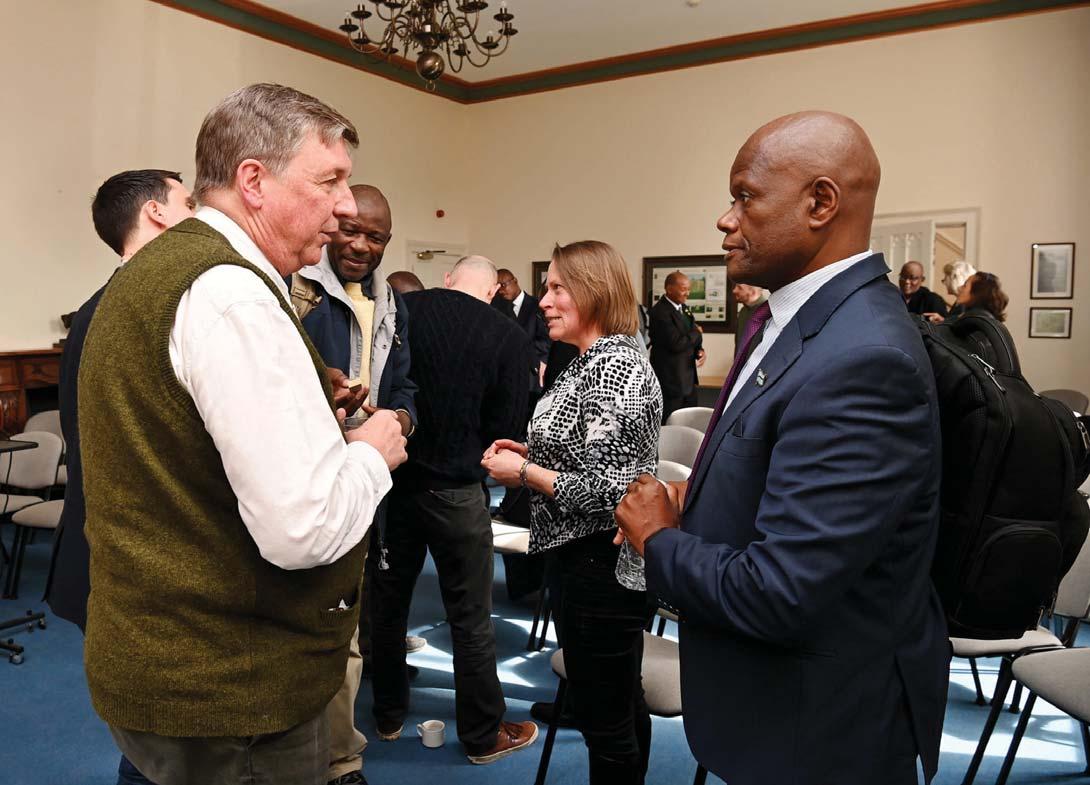
towards wildlife conservation.
The lack of benefit from wildlife by communities laid down the foundation for poaching and indiscriminate wildlife killings (e.g. through wildlife poisoning). Better put, lack of benefits from wildlife resulted in increased incidents of poaching in Ngamiland, Chobe and Boteti. It was inconceivable that 4000 wild animals were being harvested illegally each year in Ngamiland District, and that 620,000 kg of bush meat was harvested annually from the Okavango Delta (Rogan et al. 2017). This was not good for the conservation of wildlife resources and tourism development.
The Kenyan trophy hunting ban story and that of the Zambian Luangwa Valley confirms arguments by Mwenya et al (1991) argue that successful wildlife conservation is an issue of “who owns wildlife” and “who should manage it”. As such, if local people view wildlife resources as “theirs” because they realize the benefits of “owning” wildlife resources and understand that wildlife management needs to be a partnership between them and the government, there is a higher potential for them to conserve wildlife species in their areas. As a result, Passing the Bill is going to reap severe unintended consequences for conservation by undermining the trophy hunting industrythe story will repeat itself!
Finally, it should be noted that trophy hunting is a management/conservation tool when applied appropriately with the knowledge of wildlife populations. Conversely, poor
science, including emotions in decision making and policy development may result in devasting results. It is from this background that I argue that the UK Hunting Trophies (Import Prohibition) Bill is
ill-advised and dangerous to wildlife conservation and livelihoods in Botswana and Southern Africa. In this regard, it is my prayer the House of Lords in the UK should reject the Bill.
*A presentation made at Oxford University by Joseph E. Mbaiwa, PhD Professor of Tourism Studies
Okavango Research Institute University of Botswana




Over half of Africa’s people –about 600 million – lack access to even the bare minimum of electricity. The tough question to answer is how access can be extended without adding to global warming by relying on fossil fuels.
We – a team from Rwanda and Germany who work in the field of renewable energy scientific modelling – set out to find the answer by building the Renewable Power Plant Database Africa, the first on the continent. It’s a database of available open access data on hydro, wind and solar energy sources that we’ve analysed.
The database shows that some countries, such as Nigeria and Zimbabwe, have enough proj-
ects in the pipeline to potentially transition away from fossil fuels by 2050. And that 76% of all electricity required on the continent could come from renewable resources by 2040. This would happen if the capacity of existing hydro-, solar and wind power plants were fully utilised and if all plants currently on the drawing-board were built. The 76% from renewables would be met by 82% hydropower, 11% solar power and 7% wind power. Hydropower has been the main renewable energy resource to date, but declining costs for solar photovoltaics (90% decline since 2009) and wind turbines (55%–60% decline since 2010) mean solar and wind have potential to
To take ownership and accountability for the management and oversight of a project throughout its lifecycle.
OBJECTIVES OF THE POSITION
• Preparation and coordination of the project plan.
• Definition of rules and systems.
• Documentation and monitoring of progress.
• Controlling change and recommending preventative action.
• Monitoring adherence of project timeline with the decided schedule plan.
QUALIFICATION
O’LEVEL OR EQUIVALENT
EXPERIENCE
1. Atleast 3 years in a similar position or equivalent and international working experience within a similar role.
SALARY
A competitive salary commensurate with experience will be offered
If interested, send applications to:hr@kalahari-kanvas.com
Closing date: 05 April 2024
lead sustainable renewable energy options.
We conclude that combining the advantages of hydropower with wind and solar would be a more sustainable alternative to hydropower alone. And that hybrid solutions would be the best option.
But none of this can happen unless countries are willing to get into transnational electricity sharing arrangements. In addition, providing openly accessible and location specific data is fundamental for the development of an integrated sustainable renewable energy mix.
What the data says
We compiled the publicly available records of 1,074 hydropower, 1,128 solar and 276 wind power plants into one database. These were both existing and planned plants. We included the location of each proposed plant for all African countries.
We then integrated the data into a harmonised and updated database. This is the first comprehensive overview of renewable energy plants in Africa that includes their geographic coordinates, construction status and capacity (in megawatts).
This database shows that some countries have enough projects in the pipeline to potentially transition away from fossil fuels.
Hydropower is used by Eswatini, Angola, Djibouti, Gambia, Cameroon, Tanzania, Lesotho and the Democratic Republic of Congo as a major or main source of renewable electricity.
Other countries, including Egypt, South Africa, Algeria, Libya, Cape Verde, Morocco and Tunisia, are lagging behind in renewable energy development. These countries are highly electrified and their economies depend strongly on fossil fuels.
We found that hydropower could
Roger Dugmore Safaris is looking for a full time professional guide to join our mobile safari team. The candidate should have a minimum of 5 years’ experience in conducting mobile safaris in Botswana. All supporting documentation should be provided.
1. Valid full professional guides license
2. Valid Class B category driving license and valid PRDP licenses
3. Academic certificates and other qualifications
4. 3 professional references.
5. Valid level 2 First aid Certificate.
6. Mechanical experience if any, land cruiser and land rover.
7. Applicants who are shortlisted will sit for a theory and practical examination.
8. Closing date; 31st March 2024
9. Applicants who meet the above requirements can submit applications by email to:
The Manager
Eco Africa Botswana (PTY) LTD
Email: rdsafaris@ngami.net
more than double to 132GW.
This would happen if those plants that have already had feasibility studies carried out were built.
The Aswan High Dam has an installed capacity of 2.1GW and generates most of Egypt’s energy.
So 132GW would be enough to provide power for several countries.
However, hybrid solutions are more likely to provide reliable electricity to a growing population in a changing climate. The cost of wind and solar power is dropping while a recent analysis concluded that barely any hydropower will be profitable after 2030. If hydropower is not a favourable option under future climate change scenarios, wind and solar will be able to step in. Hybrid power plants that generate a combination of renewable energy are another option. A promising example of this is the installation of floating solar panels on existing reservoirs.
Share electricity, data and experience across borders
Firstly, that there is international electricity sharing between African countries. This is the only way to ensure a renewable electricity supply to all countries.
Secondly, African leaders must also move away from economic driven development and integrate the different interests from people involved or affected, such as local residents, the general population, and governmental and non-governmental organisations. In the past, the land-intensive expansion of renewable power plants has caused conflicts with farmers, national parks and industries.
Thirdly, renewable energy development must include the interests of different people involved or affected by new energy projects, such as local communities and the general population. In the past, the land-intensive expansion of renewable power plants has caused conflicts with farmers, national parks and industries.
Fourth, governments must share experience across borders to avoid mistakes such as damming the Nile River for hydropower.
The Aswan High Dam, for example, disturbs the transport of sediments down to the delta of the Nile, threatening the highly biodiverse wetlands and inducing shoreline erosion, putting humans at risk. The Great Ethopian Renaissance Dam, currently under construction, is a recent prominent example of the need for cooperation and river management across borders, especially when facing potential impacts of climate change like droughts on the efficiency of the hydropower plant.
Fifth, we call for a general rethink on how data is managed. All data should be shared and openly accessible across the world. Countries need to share high-quality data, including data about their power plants. High-quality data is key to analysing the different routes that electricity development should take across the continent in future. Such projections are only as good the knowledge and data they are based on. African countries that follow this route will be global role models for a renewable energy transition. TheConversation.

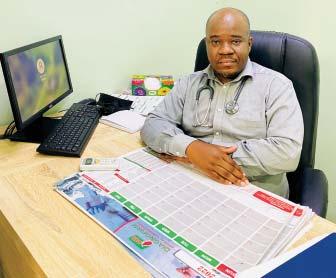
* With Dr Bernard Morapedi
World Down Syndrome
Day is marked every year on the 21st of March. This has been done since 2007. This year is no different, as this day will be commemorated under the theme “End the Stereotypes”. On this day usually people wear colourful socks, mismatched socks and even shoes.
The idea is to start a conversation, so when people ask you about your socks you can tell them, “I’m wearing them to raise awareness of Down syndrome”. This week’s column will focus on the clinical aspects of this condition and explaining what it entails.
Down Syndrome is a genetic condition that is common. Individuals that have this condition are born with an extra chromosome. Usually individuals have 23 pairs of chromosomes making a total of 46, while those with Down Syndrome have 47, as they have an extra chromosome 21.
Chromosomes are small packages of DNA that contain our genetic material. This condition can happen to anyone and can occur randomly. It has been shown though that mothers that are above the age of 35 years are more at risk of giving birth to babies with Down Syndrome.
The extra genetic material results in some developmental delays and physical changes that are typical of Down Syndrome. The severity of the condition also differs among individuals. Some of the common features of this condition include distinct facial features which include a small head, short neck, flat face, upward slanting eye lids, small ear and a protruding tongue. This babies are usually small and can have poor muscle tone. They may have small, broad hands and feet. Their hands may have only 1 line across the palms. In addition to the physical features there is delay in the development of language.
They may also have their short term and long term memory affected. They may also have some behavioural problems which include stubbornness, tantrums, and difficulty paying attention.
As this babies grown into adulthood unfortunately the can develop some other complications related to the condition. Some of these complications include heart defects, with the most common being holes in between the heart chambers. They also have to spinal problems which can lead to malalignment of the spine, weight gain, sleeping problems, abnormalities of the stomach and intestines and they also have poor immune systems which predisposes them to recurrent infections and some blood cancers. People with Down Syndrome are also at an increased risk of developing dementia. There is no specific way of preventing Down Syndrome. Mothers who are at risk need to discuss with a genetic counsellor before planning on getting pregnant again. Those that are already pregnant can have a test in early pregnancy at around 10 to 14 weeks to determine if they are at risk of having a baby with this condition.
It is important that we have a better understanding of this condition and are able to pick it up as well as to be able to better manage the complications. Individuals with this conditions are able to live a fulfilling life way into adulthood and it’s up to us to be more acceptful and “end stereotypes”
Dr Bernard Morapedi Specialist Physician
MBChB (UP), Dip HIV MAN (SA), MMED (Internal Medicine), FCP (SA).
Based at Doctors INN health center and Maun Private Hospital.
drbernard.morapedi@ gmail.com
75170521
NOTICE TO ADVERTISERS
PUBLIC NOTICE
Winsome Brothers Pty Ltd of plots no.10425 and 10426 wishes to consolidate their plots and change their use from single family residential to commercial (Retail) in Maun Village. Whoever has
All employment advertisements are also carried in our Internet edition for worldwide distribution, FREE OF CHARGE. Personal notices for Births, Deaths, Engagements and Marriages are carried free of charge.
any objection should contact the North West District Council, Physical Planning Office or call cellphone no. 71203186 within forteen (14) working days of publication of this notice (1161) Notice to neighbours of Xaro Pty Ltd at Samochima Village, the plot is accesable by a gravel road through Samochima Village. Then drive down to the river after 3 kilometers away from the village
ADMINISTRATION OF ESTATEACT (Cap.31:01)
NOTIE IS HEREBY given that by virtue of section 31of the administration of Estates Act (Cap:33:01), heirs and next of kin of the deceased and all persons having claim against the above estate, are being called upon to attend before the Master of the High Court at Maun Hgh Court on the date and time specified opposite the names of their deceased relatives for purposes of recommending for appointment, a person or persons as Executor/Executrix Dative as well as identifying benefeciaries and to discuss any other business relating to their deceased relative.
DATED AT MAUN THIS 8TH DAY OF MARCH 2024
MASTER OF THE HIGH COURT
Quoqao, Xharaxao, Boro and Daunara regarding the proposed construction of Lodge and camp site by Delta Plans (Pty) Ltd.
THE DEVELOPMENT PROPOSAL INVOLVES
The project involves construction of a lodge and campsite comprising of 10rooms and 10 tented accommodation in a 25ha plot at Daunara NG 32.
ANTICIPATED EFFECTS AND BENEFITS POSITIVE IMPACTS
• Creation of employment during and post construction phase
• Improvement of the Country’s tourism sector
• Potential economic growth
• Availability of eco-friendly and luxurious accommodation for tourists.
NEGETIVE IMPACTS
• Potential Disturbance of the World Heritage site
• Waste generation
• Potential destruction of important breeding areas for fauna.
A kgotla meeting will be held in order to disseminate important project information and also to gather the views and concerns of the community regarding the proposed project.
Delta Plans (Pty) Ltd Kgotla Meetings
VENUE TIMEDATE
Xaxaba 1000hrs16/04/2024
Xharaxao1400hrs16/04/2024
Boro0900hrs15/04/2024
Daunara1100hrs15/04/2024
Quxao1400hrs15/04/2024
DATE AND VENUE FOR THE PUBLIC MEETING
Proponent
Delta Plans (Pty) Ltd
P O Box 1411
Maun
KITSISO SECHABA
THERISANO MABAPI GO DIRA TSHEKATSHEKO YA SEEMO SA TIKOLOGO MABAPI LE AGIWA GA LEFELO LA BOROKO LE A DIKAMPA KO XHORO NG 32 KE BA DELTA PLANS (PTY) LTD
Go ya ka molao wa Botswana wa Environmental Assessment Act 2020 (Amendment) wa go tlhokomela tikologo, Sechaba se lalediwa phuthego kwa dikgotleng tse dilatelang: Xaxaba, Quoqau, Xharaxara, Daunara,le Boro. Phuthego e e mabapi le kopo ya kompone ya Delta Plans ya go aga lefelo la boroko le na le dikamore dile lesome(10) le ya maroko a go kampa a a ka amogelang baeng ba le lesome (10).
DITLHABOLOLO DI AKARETSA TSE DI LATELANG
Tiro e e akaretsa kago ya lefelo la boroko le na le dikamore dile lesome(10) le ya maroko a go kampa a a ka amogelang baeng ba le lesome (10). Dikago tse di tla agiwa ko Daunara NG 32 mo lefelong la diyekere tse masome mabedi le botlhano (25).
DITLAMORAGO TSE DI SOLOFETSWENG DITLAMORAGO TSE DI SIAMENG
• Go thamiwa ga mebereko ka nako ya kago le fa lefelo le setse le le mo tirisong
• Go tlhabologa ga mohama wa tsa bojanala
• Kgonagalo ya kgolo ya itsholelo ya lefatshe
• koketsego ya mafelo a boroko a a manobonobo e bile a babaletse tikologo a tsa Bojanala.
DITLAMORAGO TSE DI SA SIAMANG
• Go kgotlelesega ga Makgobokgobo a Okavango
• Go kgothega ga tokologo
• Go senyega ga mafelo a a tsalelang diphologolo le dinonyane. Moikaelelo a phuthego e ke go itsise morafe ka ditlhabololo tse di tlang le go tsaya mogopolo ya bone mabapi agiwa ga mafelo a boroko ko Daunara NG 32.
NAKO LE LEFELO LA PHUTHEGO VENUETIMEDATE
Xaxaba1000hrs16/04/2024
Xharaxao1400hrs16/04/2024
Boro0900hrs15/04/2024
Daunara1100hrs15/04/2024
Quxao1400hrs 15/04/2024
Mong wa tiro:
Delta Plans (Pty) Ltd
P O Box 1411
Maun
on a sandy road. The owner of the aforesaid plot wishes to change land use from lodge plot to intergrated farm plot. Neighbours may contact Maun Administrative Authority, Physical Planning Office at 6861844 if they disapprove this change within 21 days (1161)
EMPLOYMENT
4 x Commercial Helicopter
Line Pilot. Valid CPL (H) license and Robinson ratings
essential. Bell 206 rating an advantage. The successful candidate will be expected to operate from remote locations within Botswana. Please apply to the Operations Manager, Helicopter Horizons, P. O. Box 66, Maun. Tel: 680 1186 (1161/1162)
Technical Services Manager Vacancy – Abu Private Reserve, Okavango Delta. The main role of the Technical Services Manager (TSM) is
Administration of Estates Act [Cap.31:01]
to provide technical support and advice to the property. The TSM is responsible for the management of the Concession, environmental plans, the assessment of assets, the property security and the management of the maintenance team in line with OHS legislation and internal operational standards. Applications or queries may be sent to: kemmonye.w@abupr.africa (1161)
Notice is hereby given that by virtue of Section 31 of the Administration of Estates Act (Cap: 33:01), heirs and next of kin of the deceased and all persons having claims against the above estate, are being called upon to attend before the Master of the High Court at Maun High Court on the date and time specified opposite the names of their deceased relatives for purposes of recommending for appointment, a person or persons as Executor/Executrix Dative as well as identifying beneficiaries and to discuss any other business relating to their deceased relative.
DATED AT MAUN THIS 23rd day of FEBRUARY 2024 MASTER OF THE HIGH COURT
PUBLIC NOTICE
NOTICE OF ENVIROMNENTAL IMPACT ASSESSMENT PROCESS FOR THE PROPOSED PROJECT-
CONSTRUCTION OF LODGE AND CAMP SITE AT XHORO NG 32 BY WILD TRACK SAFARIS (PTY) LTD Notice is hereby given in terms of the Botswana Environmental Assessment Act (Amendment), 2020 to hold a consultative kgotla meetings in Xaxaba, Quoqao, Xharaxao, Boro and Daunara regarding the proposed construction of Lodge and camp site by Wild Track Safaris at Xhoro NG 32
THE DEVELOPMENT PROPOSAL INVOLVES
The project involves construction of a lodge and campsite comprising of 10rooms and 10 tented accommodation in a 25ha plot at Xhoro (Boro 2) NG 32.
ANTICIPATED EFFECTS AND BENEFITS POSITIVE IMPACTS
• Creation of employment during and post construction phase
• Improvement of the Country’s tourism sector
• Potential economic growth
• Availability of eco-friendly and luxurious accommodation for tourists.
NEGETIVE IMPACTS
• Potential Disturbance of the World Heritage site
• Waste generation
• Potential destruction of important breeding areas for fauna.
A kgotla meeting will be held in order to disseminate important project information and also to gather the views and concerns of the community regarding the proposed project.
DATE AND VENUE FOR THE PUBLIC MEETING
Wild Track Safaris (Pty) Ltd Kgotla Meetings
VENUE TIMEDATE
Xaxaba10:30am16/04/2024
Xharaxao1430hrs16/04/2024
Boro0930hrs15/04/2024
Daunara1130hrs15/04/2024
Quxao1430hrs15/04/2024
Proponent Wild Track Safaris (Pty) Ltd P O Box 76753790
Maun
KITSISO SECHABA
THERISANO MABAPI GO DIRA TSHEKATSHEKO YA SEEMO SA TIKOLOGO MABAPI LE AGIWA GA LEFELO LA BOROKO LE A DIKAMPA KO XHORO NG 32 KE BA WILD TRACK SAFARIS (PTY) LTD
Go ya ka molao wa Botswana wa Environmental Assessment Act 2020 (Amendment) wa go tlhokomela tikologo, Sechaba se lalediwa phuthego kwa dikgotleng tse dilatelang: Xaxaba, Quoqau, Xharaxara, Daunara,le Boro. Phuthego e e mabapi le kopo ya kompone ya Wild Track Safaris ya go aga lefelo la boroko le na le dikamore dile lesome(10) le ya maroko a go kampa a a ka amogelang baeng ba le lesome (10).
DITLHABOLOLO DI AKARETSA TSE DI LATELANG
Tiro e e akaretsa kago ya lefelo la boroko le na le dikamore dile lesome(10) le ya maroko a go kampa a a ka amogelang baeng ba le lesome (10). Dikago tse di tla agiwa ko Xhoro (Boro 2) NG 32 mo lefelong la diyekere tse masome mabedi le botlhano (25).
DITLAMORAGO TSE DI SOLOFETSWENG DITLAMORAGO TSE DI SIAMENG
• Go thamiwa ga mebereko ka nako ya kago le fa lefelo le setse le le mo tirisong
• Go tlhabologa ga mohama wa tsa bojanala
• Kgonagalo ya kgolo ya itsholelo ya lefatshe
• koketsego ya mafelo a boroko a a manobonobo e bile a babaletse tikologo a tsa Bojanala.
DITLAMORAGO TSE DI SA SIAMANG
• Go kgotlelesega ga Makgobokgobo a Okavango
• Go kgothega ga tokologo
• Go senyega ga mafelo a a tsalelang diphologolo le dinonyane. Moikaelelo a phuthego e ke go itsise morafe ka ditlhabololo tse di tlang le go tsaya mogopolo ya bone mabapi agiwa ga mafelo a boroko ko Xhoro (Boro 2) NG 32.
NAKO LE LEFELO LA PHUTHEGO VENUE TIMEDATE
Xaxaba10:30am16/04/2024
Xharaxao1430hrs16/04/2024
Boro0930hrs15/04/2024
Daunara1130hrs15/04/2024
Quxao1430hrs15/04/2024
Mong wa tiro:
Wild Track Safaris (Pty) Ltd
P O Box 76753790
Maun
Three schools from Botswana that participated at the First Lego League competitions held in Kigali, Rwanda over the weekend have brought home two awards.
Team Botswana which consisted of students from Kagiso Senior School (Ramotswa) Livingstone House Primary School (Orapa) and Kgale Hill CJSS (Gaborone) scooped 1st place in the Innovation Project International
Award and 2nd place in the Robot Performance International Award.
Team Botswana participated in the 6 nations competitions, in which schools from Rwanda, Nigeria, Ghana, Uganda and Benin also participated. In the competition, teams were judged in four main categories that include Core values, Innovation Project, Robot design, and Robot game. Teams participating in the FLL competition were expected to excel in all these
areas, demonstrating a holistic understanding of robotics, problem-solving, teamwork and innovative thinking.
In an interview, Dare to Dream Media Personnel Letlhogonolo Peter said that the competitions offer a significant benefit to both students and the country. He stated that the awards promote Science, Technology, Engineering and Mathematics (STEM) education through hands-on learning, fostering critical thinking, problem-solving, and

TENDER NO. MSSS 2024-2026 SUPPLY OF BREAD AND RATION MEAT FOR THE YEAR 2024-2026.
Tenders are invited for the supply and delivery of Bread and Ration Meat; Tenders should be valid Botswana licensed businesses.
Tender documents can be collected starting on the 4th March 2024 at the Bursar’s Office between 08:00 hours – 12:45 hours and 14:00 hours to 15:30 hours. The closing and opening date is 1st April 2024.
A non-refundable fee of P100.00 will be charged for each copy collected.
La Salud (Pty) Ltd intends to undertake an Environmental Impact Assessment (EIA) to establish an Agro-tourism (Lodge) at Mababe, North West District. The EIA study shall be to identify both positive and negative impacts of the operations in terms of:
a)Air and noise pollution
b)Roads accidents
c)Employment creation
d)Village development
In terms of the Environmental Assessment Act (Cap. 65:07), Section 7, members of the public, interested and affected parties are invited for a public meeting in April 4, 2024 at Mababe Kgotla in Mababe village at 10:00 hrs in the morning. The purpose of the meeting is to get views from the general public in order to include pertinent issues in the EIA report.
For further information contact: Tel: 74403248 / 74120634
La Salud (Pty) Ltd e rulaganya go dira tshekatsheko tikologo (EIA) mabapi le go dira bojanala jwa temo (Agro-tourism) kwa Mababe mo kgaolong ya Bokone Bophirima. Tshekatsheko e tla bo e itibaganya le ditlamorago tsa tiro e e akantsweng go lebilwe:
a)Modumo le lerole
b)Dikotsi mo tseleng
c)Tlhamo ya mebereko
d)Tlhabololo ya motse
Ka tsetla ya molao wa tsa tikologo (EA Act (Cap. 65:07)), ntlha ya tsetla ya bosupa (section 7), botlhe ba ba nang le kgatlhego kgotsa ba amega ba kopiwa go tla phuthegong kwa kgotleng ya Mababe mo motseng wa Mababe, kgwedi ya Moranang e le 4, 2024 ka nako ya 10:00 hrs maphakela. Fa o tlhoka go itse go feta fa, leletsa: Tel: 74403248 / 74120634
teamwork skills. He said, through the competition, participants gain inspiration, motivation, and global competitiveness, while also contributing to economic growth by developing a skilled STEM workforce. He said that FLL competitions engage communities, nurture future innovators, and ensure long-term societal impact by preparing students for careers in STEM fields. Peter noted that as a way of recognising their outstanding performance President Paul Kagame of Rwanda awarded
each participant from team Botswana with a laptop.
Meanwhile, the three schools that were selected to represent Botswana in Rwanda were winners in the First Lego League Challenge Masterpiece Botswana regional competitions that were held on the 24th November 2023 at Botswana Digital Innovation Hub in Gaborone. The regional competitions had brought together schools from various regions across Botswana including Maun, Orapa, Kang, Takatokwane, Molepolole, Lobatse, Ra-
motswa, Mogoditshane and Gaborone.
They were hosted by the Ministry of Communications, Knowledge and Technology, Ministry of Education and Skills Development in collaboration with Dare To Dream Academy. Dare to Dream Academy is an NGO based in Botswana dedicated to the advancement of youth, women and girls in STEAME (Science, Technology, Engineering, Arts, Mathematics and Entrepreneurship) as well as Aviation and Aerospace.
The Botswana Cricket Association (BCA) in collaboration with India’s based Karnataka State Cricket Association (KSCA) are currently hosting a skills transfer and development program, with a view to enhance the coaching capabilities and capacity of the BCA development team.
The program commenced on the 15th March and is expected to end on the 30th March. KSCA’s highly experienced technical team consisting of three experts is currently working very closely with BCA coaches in an intense programme encompassing theoretical and practical components of the game, which will continue even after their return, through digital platforms.
In an interview, BCA Vice Chairman Sumod Damodar said that the main objective of the program is to enable the
transfer of knowledge, information and skills to the BCA coaches and development teams. Damodar said that they have identified some local coaches to acquire the technical skills from the KSCA team at the same time working with players.
He noted that it was the first time for BCA embarked on such a program where they have technical staff, highly qualified and experienced coaches, adding the initiative will have a tremendous effect, even when the KSCA team goes back to India. He noted that the KSCA has one of the best cricket set ups in India that is highly rated around the world coaching structures. “The schedule for the activities include practice games and training sessions for the U-19 girls which was completed last weekend, whereas the training for the U-19 Boys/Men will be completed this week,’’ he said.
Damodar said during the program, the U-19 boys and girls team will play couple of games before training sessions so that KSCA have a brief idea of what the calibre and capability of the players are.
He urged the players and coaches to take the opportunity with extreme levels of seriousness, to make every effort to observe, learn and implement all the knowledge that would be made available to them during the period.
Meanwhile, Damodar has stated that the BCA’s association with KSCA started last year in August and February through the High Commission of India, Botswana. He said that as part of their collaboration BCA Women’s team (The Herons) took a visit to Bengaluru in November 2023 for a two weeks’ program, where they had an intensive training at the invitation of KSCA.
NOTICE OF PROPOSED TRANSACTION IN TERMS OF SECTION 23 AND 34 OF THE TRIBAL LAND ACT
Description of Land
Certain: Piece of land being residential plot
Situate: at Boseja, plot 20740
Measuring: approximately 50m x 50m
Filed under: certificate of customary Land Grant dated 02 October 1986 in favour of Mosalla Mabote
Full names of parties to the proposed transaction
Seller: Mosalla Mabote
Purchaser: Deogratias Ongona Mbuka
Details of the proposed transaction
The purchaser wishes to purchase the sellers rights, title and interest regarding the above mentioned property.
Consideration for the proposed transaction
BWP 280, 000.00
Reference
This is to give notice that any citizen of Botswana interested in entering into a similar transaction in respect of the property in question shall receive priority and must, I interested, write to the Board Secretary of Maun Sub Land Board, Private Bag 201, Maun.
Please note that the proposed transaction as stated shall take place within 30 days from the date this notice is published.
KEBONYEMODISA LAW OFFICE
PLOT NO. 3152, AUDI RD, MAUN
P O BOX 250155, WENELA, MAUN
TEL: +267 868400

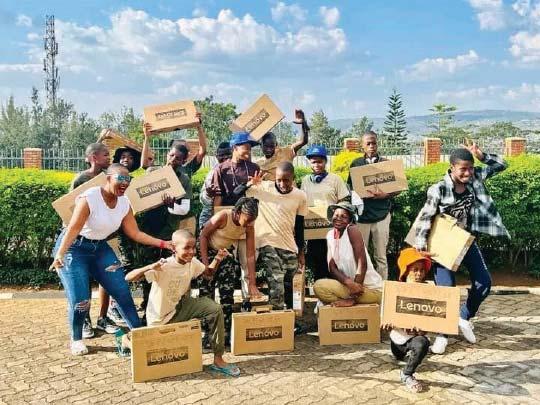

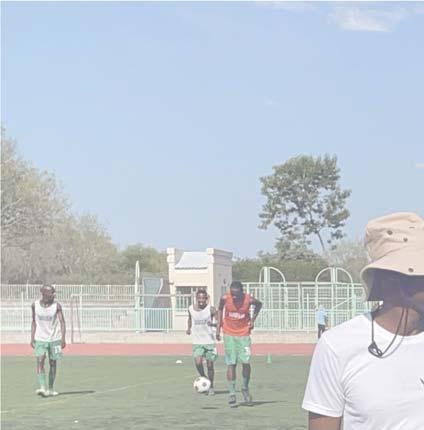

 By Jayson Samokunda
By Jayson Samokunda
As the contest for the highly competitive First Division North League (FDNL top spot intensifies, the likes of Sankoyo Bush Bucks, BR Highlanders and Motlakase Power Dynamos are in the race for the title and promotion to the elite league next season.
Sankoyo Bush Bucks goes into tomorrow’s fixture against Makungulupeswa with determination to win to keep their Botswana Football League (BFL) return hopes alive. Ngurungu, goes into the game seating on third position with 23 points, a difference of 4 points

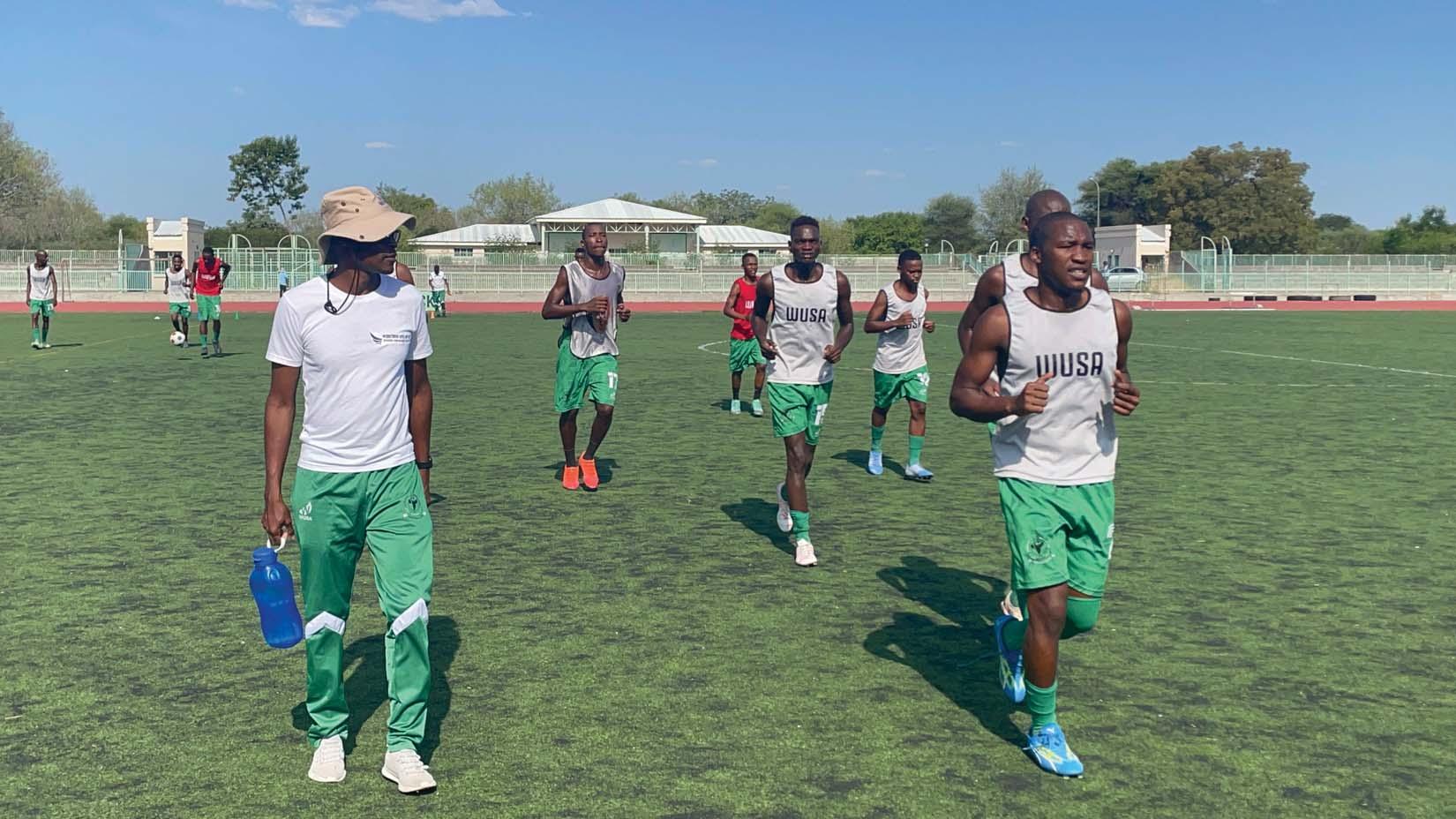
between them and the First Division North (FDN) log leaders Motlakase Power Dynamos. Their remaining seven (7) fixtures are critical for their hopes to return to the elite league next season since their premier league exit in 2019. After tomorrow’s fixture, Sankoyo will remain with six matches, away against Peacemakers, BR Highlanders (Home), Chadibe and Pilikwe United (Away) and welcome Tsabotlhe before ending the season away to Santa Green.
In all of their remaining 7 opponents, Sankoyo managed to collect 13 points after winning against Pilikwe, Peacemak-
ers, and Santa Green, a draw against BR Highlanders as well as losing to Chadibe and Tsabotlhe in the first round of the league fixtures.
Sankoyo head coach Likha Paphani informed Times Sport that the team is in good form to fight for promotion into the elite league come the 2024/25 season, an indication that tomorrow’s fixture is a must win.
“We won 2-1 against Makungulupeswa in the first round therefore we are positive that we will go through tomorrow. We are hopeful that we can do well against our remaining opponents of the season,” he said, further indicating that if


they can win their three home games and four away fixtures, then they will stand a chance for promotion.
Sankoyo will possibly end the season with 44 points if they win all their remaining fixtures and importantly, winning against BR Highlanders at home, the team that is in the second sport with 25 points. Meanwhile, Motlakase Dynamos, the team with an impressive performance throughout the season and currently sits at the pinnacle of the league table. Their consistency and tactical prowess have made them the team to watch while BR Highlanders, not far behind
and is hot on the heels of the leaders, Motlakase Power Dynamos.
BR Highlanders attacking style of play and solid defense have earned them a well-deserved second position and the question is, can they maintain their form until the end of the season.
Times Sport took a look at the bottom table where you find the likes of Pilikwe United and Makungulupeswa in the red zone (Relegation Zone) with all the two teams drawn their last week matches against second spot bound, BR Highlanders and third spot, Sankoyo Bush Bucks respectively.
Though they are in the relegation zone, chances are high that they can survive the relegation if they collect important points from their last seven games looking at the fact that there are 3 points away from relegation with both having accumulated 14 points.
The count-down continues tomorrow (Saturday) as the log leaders travel to meet Mbalakalungu at Prisons grounds in Kasane. Peacemakers take on Chadibe while Tsabotlhe are up against Calendar Stars. Santa Green welcomes Green Lovers at Pekenene CJSS. All games start at 1630 hrs.
